The road to hell is paved with good intentions
Winged Words A B C D E F G H I J K L M N O P Q R S T U V W Y Z
Table of contents
· 1 The mouse doesn't bite off a thread
· 2 Not a dry eye in the house
· 3 There he goes and sings no more!
· 4 That's where it all ends!
· 5 The coral laughs
· 6 There's the rub
· 7 There lies the dog buried
· 8 There the singer's politeness is silent
· 9 Here I am, poor fool! And am as wise as before
· 10 But down there it is terrible
· 11 You know what you've got ... Good evening!
· 12 You will be helped there!
· 13 Then women become hyenas
· 14 Being there is everything
· 15 How I recognise my friends
· 16 So that was the crux of the matter
· 17 The Other Sex
· 18 Combining the pleasant with the useful
· 19 Someone other than me understands that.
· 20 The better is the enemy of the good
· 21 The little bit of household
· 22 The bread of the early years
· 23 This is the curse of the evil deed.
· 24 The eternal
· 25 The Eternal Feminine
· 26 The whole of Germany should be
· 27 The dangerous age
· 28 It goes its socialist way
· 29 It only happens once, it never happens again
· 30 Happiness is a light harlot
· 31 Listening to the grass grow
· 32 The Big Eat
· 33 The biggest insect is the elephant
· 34 The good - this sentence stands firm - is always the evil that one leaves
· 35 The shirt is closer to me than the skirt
· 36 The heart has its reasons that the mind does not know
· 37 The highest of feelings
· 38 The highest happiness on earth
· 39 The High Song
· 40 The Empire Strikes Back
· 41 This is the misfortune of kings, that they do not hear the truth
· 42 This is the beginning of a wonderful friendship
· 43 This is the curse of our noble house: to strive hesitantly in half ways and half deeds with half means.
· 44 This is the epidemic of our time: madmen leading the blind.
· 45 This is the sun of Austerlitz!
· 46 This is Lützow's wild, daring hunt
· 47 This is more than a crime, this is a mistake
· 48 Surely this cannot shake a sailor
· 49 No pig can read that
· 50 Calling a spade a spade
· 51 The Child in the Man
· 52 The lesser evil
· 53 The Artificial Silk Girl
· 54 Searching the land of the Greeks with the soul
· 55 The land where milk and honey flow
· 56 Life is not a pony farm
· 57 Life is short, art is long
· 58 This is the Berlin air
· 59 The next game is always the hardest game!
· 60 The horse does not eat cucumber salad
· 61 The principle of hope
· 62 The cunning beast did it for the sake of rhyme
· 63 The round must go into the square
· 64 The destiny of man is man
· 65 Fate sets the plane to work
· 66 Being determines consciousness
· 67 This looks very clear
· 68 These are the practitioners of the world....
· 69 The game is off
· 70 The miller's delight is to wander
· 71 The Word on Sunday
· 72 The miracle is faith's dearest child
· 73 The goal is nothing, the movement everything
· 74 That the soft water in motion over time defeats the mighty stone
· 75 Standing there like Buridan's donkey
· 76 It's not the end of the world
· 77 De gustibus non est disputandum
· 78 De mortuis nil (= nihil) nisi bene
· 79 Your wish was the father of the thought
· 80 Déjà vu
· 81 Well known to the office
· 82 Far from the eye, near to the heart
· 83 Nothing can be sworn to the engineer
· 84 Giving to the emperor what is the emperor's
· 85 To the living spirit
· 86 The man can be helped
· 87 I do not desire thanks, lady
· 88 We leave the sky to the angels and the sparrows
· 89 Modesty adorns the youth
· 90 All the livelong day
· 91 All is pure to the pure
· 92 The Lord gives it to His own in their sleep
· 93 Neither ox nor donkey stops socialism in its tracks
· 94 Close the curtain and all questions open
· 95 Not seeing the wood for the trees
· 96 When I think of Germany at night...
· 97 For all guilt is avenged on earth
· 98 For Brutus is an honourable man
· 99 Because one thing is certain: the pension
· 100 ...for they know not what they do
· 101 Because what you have in black and white you can take home with confidence
· 102 The eagle has landed.
· 103 Appetite comes with eating
· 104 The doctor helps, nature heals
· 105 The ball is round
· 106 The report about my death was greatly exaggerated
· 107 He needs a long spoon who eats with the devil
· 108 The bureaucrat does his duty
· 109 The only dung on which nothing grows is the pessimist
· 110 ... the tongues of women never rest.
· 111 An alley for freedom!
· 112 The God Who Made Iron Grow
· 113 The Great Zampano
· 114 The Lord gave, the Lord has taken away
· 115 The eavesdropper on the wall hears his own shame
· 116 Jürgen Klinsmann and me, we're a good trio
· 117 The captain is the last to disembark
· 118 The small difference
· 119 The Congress dances
· 120 The war feeds the war
· 121 War is the father of all things
· 122 War is the continuation of politics by other means
· 123 The eavesdropper on the wall hears his own shame
· 124 The Last of the Mohicans
· 125 The pilot disembarks
· 126 The Man Without Qualities
· 127 Man is born free, and everywhere he lies in chains
· 128 Man is what he eats
· 129 Man is neither angel nor beast, and misfortune wills that whoever wants to make an angel out of him will make a beast out of him.
· 130 Man does not live by bread alone
· 131 The Moor has done his duty
· 132 The murderer is always the gardener
· 133 The next winter is sure to come
· 134 The East is Red
· 135 The rest is silence
· 136 The womb is still fertile from which this crawled
· 137 The shot heard around the world
· 138 The state is me
· 139 The ballot paper is stronger than the bullet
· 140 The stuff dreams are made of
· 141 The Devil is a Squirrel
· 142 Death is a Master from Germany
· 143 The tourist destroys what he seeks by finding it
· 144 Madness, when it becomes epidemic, is called reason
· 145 The real Jacob
· 146 The road to hell is paved with good intentions
· 147 The last word in wisdom
· 148 The wind told me a song
· 149 Enough words have been spoken, let me finally see action
· 150 The die is cast
· 151 The end justifies the means
· 152 The one who
· 153 The Emperor's New Clothes
· 154 The toil of life
· 155 Despotism tempered by sloppiness
· 156 Deus ex machina
· 157 Being German means doing a thing for its own sake
· 158 German workers, the SPD wants to take away your villas in Ticino!
· 159 German revolutionaries occupy a station only after buying a platform ticket
· 160 German Michel
· 161 Germany, united fatherland
· 162 Germany must live, and if we must die
· 163 Germany above all!
· 164 Germany's future lies on the water
· 165 Poetic freedom
· 166 Poetry and truth
· 167 Only the wind knows the answer
· 168 Poverty comes from the powerteh
· 169 The eyes of the world are upon you
· 170 The axe in the house saves the carpenter
· 171 The basis of a healthy order is a large wastepaper bin
· 172 The best of all possible worlds
· 173 The best wife of all
· 174 The bombing of Russia begins in five minutes
· 175 The White Man's Burden
· 176 The earth has me again
· 177 Let the earth be light to you!
· 178 Memory is the only paradise from which we cannot be driven
· 179 The first shall be last and the last shall be first
· 180 The owl of Minerva only begins its flight as dusk falls
· 181 The flag high!
· 182 The woman is silent in the community
· 183 All the world's a theatre
· 184 The Guard Dies and Does Not Surrender
· 185 The Secret Seducers
· 186 The curved road is the way of the donkeys
· 187 Seizing the opportunity
· 188 The straight line is godless
· 189 The heroes are tired
· 190 Hell, it's the others
· 191 The dogs bark, but the caravan moves on
· 192 Those I called, the spirits
· 193 You can't see the ones in the dark
· 194 The whole direction doesn't suit us!
· 195 The Emperorless, the Terrible Time
· 196 The culture of a people is based on the consumption of soap
· 197 Art goes to bread
· 198 The situation has never been so serious
· 199 The last days of humanity
· 200 Reading the riot act
· 201 The love of gypsies comes from
· 202 People like to believe what they wish
· 203 The murderers are among us
· 204 The seagulls all look like they were named Emma
· 205 The upper ten thousand
· 206 The party, the party, it is always right
· 207 The philosophers have only interpreted the world differently, but it is important to change it.
· 208 Political power comes from the barrels of guns
· 209 The police - your friend and helper
· 210 The revolution eats its own children
· 211 The harshest critics of the moose used to be themselves
· 212 The school of the nation is the school
· 213 Unwinding the soul
· 214 Germany's security is also defended in the Hindu Kush.
· 215 The sun brings it to light.
· 216 The Romans are crazy!
· 217 Language is given to man to conceal his thoughts
· 218 The Voice of His Lord
· 219 The grapes hang too high
· 220 The Unbearable Lightness of Being
· 221 The past should be a springboard, not a sofa
· 222 Lay down your arms!
· 223 Seeking the truth in the facts
· 224 Unhinging the world
· 225 The world wants to be deceived
· 226 World history is not the ground of happiness
· 227 The Wonderful Years
· 228 Human dignity is inviolable
· 229 This was the first strike
· 230 Thing in itself
· 231 Do ut des
· 232 But the blessing comes from above
· 233 But the conditions, they are not so
· 234 Don't worry, be happy!
· 235 Where you burn books, you also burn people in the end
· 236 Dr Livingstone, I presume?
· 237 Draconian punishment
· 238 Outside the door
· 239 Three Graces
· 240 Three times moved is as good as once burnt down
· 241 Third World
· 242 Therefore test who binds himself eternally....
· 243 You are Germany
· 244 You are what you eat
· 245 You are like a flower
· 246 You will always be what you are
· 247 You see the waistcoat, not the heart
· 248 Looking stupidly out of the laundry
· 249 Stupid fucks good
· 250 Dark Continent
· 251 Shine through absence
· 252 A jolt must go through Germany
· 253 Through the forests, through the meadows
· 254 Through this hollow alley he must come
· 255 Through my fault
· 256 Through the mouth of two witnesses the truth is made known.
· 257 Individual references
Not a dry eye in the house
These colloquially often used words come from the poem Paul. A hand drawing by the theologian and writer Johannes Daniel Falk. It can mean that everyone laughs until tears come, or that everyone is moved and cries.
The line follows the verses:
In black funeral choruses,
young and old wave To the
tolling of the bells In
our churchyard
There he goes and sings no more!
The quotation comes from the second edition of the song play Die Kunst, geliebt zu werden by the singing pedagogue Ferdinand Gumbert, published in 1866.
"There he goes and sings no more! That's how it is and that's how it was. The old man got his hat back and the crowd trolled away!"
It is used as a joking comment when someone dejectedly leaves or resigns from his post after a failure. For example, an article about the surprising resignation of the Belgian TV manager Guillaume de Posch at ProSiebenSat.1 Media is headed with the following words:
"Guillaume de Posch - There he goes and sings no more."
That's where it all ends!
This common expression meaning "That's outrageous!" comes from the farce by the comedy poet Louis Angely's Die Reise auf gemeinschaftliche Kosten - Komisches Gemälde in fünf Aufgen, which was largely localised in Berlin after French comedy plays. In the first scene of the second act, it reads:
"That's where it all ends."
The writer Paul Heyse wrote about this play in his memoirs of his youth:
"I received my first full impression of real stagecraft through a farce at the Königstadt Theatre, "Die Reise auf gemeinschaftliche Kosten", in which Beckmann's comic talent charmed me."
There the coral laughs
This expression goes back to a 1930s illustrated magazine called Koralle from the Ullstein publishing house, whose joke page bore the headline "Da lacht die Koralle".
"The magazine of the same name, not unlike today's BUNTEN, is no longer known to anyone after some 60 years. The title of its joke page, however - 'Da lacht die Koralle' - has sintered into the vernacular."
This headline was also used by the news magazine Der Spiegel in 1972 for an article about the comic paper Zack, which was published by the Axel Springer Group in its subsidiary, Koralle-Verlag.
There lies the dog buried
This saying goes back to a 17th century inscription on a monument in the Thuringian village of Winterstein (Waltershausen):
Anno 1660 Jar ... war ein Hund hier begrawendas
in nicht fressen die Rawen ...
The faithful dog Stutzel went all alone with letters on his collar to Friedenstein to the castle of the sovereign and rendered many services through his loyalty. When he died, his mistress had him put in a coffin, and together with her servants she buried him solemnly. It is said that she even forced the dog to be buried in the cemetery, but the priest and the congregation had him dug up again and buried in the present place. This gave rise to the following proverb in the village:
"Winterstein is where the dog is buried."
Where the dog is buried lies the core of a matter. It is possible, however, that this idiom has nothing to do with the pet, but with the Middle High German word hunde, which means prey, treasure. It then means: That's where the treasure is buried.
Robert Burns' song Whistle O'er The Lave O't with the beginning "First when Maggy was my care" became Da liegt der Hund begraben in Adolf von Winterfeld's translation:
When still after Meg I sighed heavily,
She was an angel, fair and fair,
Since we were honoured - ask no more
- The dog lies buried. Meg
was as soft as the spring wind,
A child so natural and dear,
But clever ones are already deceived,
The dog lies buried.
The phrase "here the dead dog is buried" is also pejorative for a barren inhospitable area.
See also: Bloch: A Buried Dog and Where the Dog Lies Buried

Monument to the dog Stutzel
Here I stand, poor fool! And am as wise as before
At the beginning of Goethe's Faust I, Faust speaks these words after referring to all his previous studies, which he considers useless:
I have now, alas! studied philosophy,
jurisprudence and medicine, and
unfortunately also theology!
With ardent endeavour studied, indeed.
Here I stand now, poor Thor!
And I'm as clever as before;
My name's Magister, my name's Doctor,
And I've been pulling my
students' noses around for
ten years,
Up, down and across and crooked
-
The quote is invoked again and again when someone feels overwhelmed, as for example in this article about the diversity of mobile technologies:
Here I am, poor fool, and I'm as smart as I was before...
you want to lament when all the new mobile technologies are beaten into your head
every day in the news and advertising.
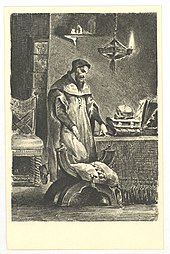
Faust in his study
But it's terrible down there
This quote comes from Friedrich Schiller's ballad The Diver, in which the diver speaks these words after successfully diving into the depths for the king's cup:
Long live the king! Let
him rejoice
who breathes in the rosy light.
But down there it is dreadful,
And man tempt not the gods,
And never ever desire to seeWhat
they graciously cover with night and horror.
People usually use the quotation jokingly, for example when they want to express their disgust at a dark cellar or a deep cave.
Friedrich Engels wrote of a visit to an emigrant ship in his 1841 travelogue A Trip to Bremerhaven:
"But it's terrible down there,' all my companions quoted as we climbed back up. Down there lay the canaille, who have not money enough to turn ninety thalers to a passage in the cabin, the people to whom one does not take off one's hat, whose customs are called mean here, ignorant there, the plebs, who have nothing, but who are the best a king can have in his kingdom, and who alone uphold the German principle, especially in America."
You know what you've got ... Good evening!
This advertising slogan, formulated by Werner Butter, was used by Volkswagen from 1969, initially for the VW Beetle and as late as the 1990s as a claim for the company.
From 1973, the Henkel Group also used it for its detergent brand Persil.
The so-called Persil man, who presented his advertising message on television, serious as a daytime newsreader, in the manner of a news programme, was supposed to convey reliability. This was necessary because Persil's market share had declined as many housewives preferred to use cheaper detergents.
The wholesale company Engelkemper takes up this slogan on the subject of brand protection and explains:
"This well-known advertising slogan of a detergent brand makes it clear what brands and brand protection are all about. Because where Persil is written on it, Persil should also be in it, that's what the buyer of branded products wants. Brand protection is therefore an important issue for all brand suppliers in order to be able to offer consumers the security of knowing that they are getting what they expect."

Persil
You will be helped there!
In 1997, the entertainer Verona Pooth (then still Verona Feldbusch) advertised for the directory enquiries Telegate in a series of satirical TV commercials. All the spots ended with the insertion of the number 11-88-0 and Pooth's commentary:
"That's where you'll get help!"
The slogan, in which Pooth flirts with her lack of grammatical certainty in German, achieved cult status and was often modified. She also used it to help Telegate, a newcomer to the stock exchange, to a highly publicised first listing on the Frankfurt Stock Exchange.
There women become hyenas
This line of poetry comes from Friedrich Schiller's Lied von der Glocke. Schiller refers to the French Revolution at this point:
"Liberty and equality!", one hears resounding; The
quiet citizen takes up arms,
The streets fill, the halls,
And gangs of strangler march about."
The unleashed masses of people rage in the streets:
"Women become hyenas and joke with horror."
Being there is everything
"Taking part is everything" or "Taking part is more than winning" is always referred to as the Olympic thought, yet it is usually the common consolation for losers, because the official Olympic motto is Citius, altius, fortius - "Faster, Higher, Stronger".
That's how I recognise my Pappenheimer
"That's how I recognise my Pappenheimers" goes back to Gottfried Heinrich Graf zu Pappenheim, whose troops played a major role in the storming and sacking of Magdeburg in 1631. In the old empire, the Counts of Pappenheim from the Altmühltal were hereditary marshals responsible for the imperial coronation ceremonies.
This sentence is often quoted in the form "I know my Pappenheimer" and comes from Schiller's drama Wallenstein's Death. There it is not meant ironically at all. In the third act of the drama, when ten cuirassiers from Pappenheim want to find out whether Wallenstein wants to defect to the Swedes, a private says to him:
But we don't believe that you are an enemy and a
traitor, we think it's just
lies and deceit and a Spanish invention.
(Faithfully. )
You yourself shall tell us what you intend,
For you have always been true with us,The
highest trust we have in you,
No foreign mouth shall come between us,The
good commander and the good troops.
Wallenstein replies gratefully, "That's how I recognise my Pappenheimer."
Today, the term "Pappenheimer" is more associated with a tongue-in-cheek insight into inadequacies. The Süddeutsche Zeitung explains this change in meaning under the headline Auf diese Phrasen können Sie bauen:
"But it was not only ironising 19th-century study councils that turned the term 'Pappenheimer' into a pejorative; since the Pappenheimer marshals were also responsible for clearing the streets of the city of Nuremberg of excrement, the disreputability of the name was in the air long before Schiller. "Da ran der Dreck / heraber keck / nach Pappenhaimers Regel," the 'Grimm' quotes an anonymous 16th century poet."
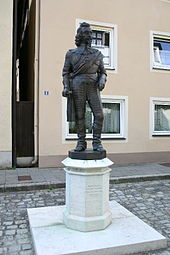
Count of Pappenheim in Pappenheim
So that was the crux of the matter
The saying comes from Goethe's drama Faust I (study room scene). During the Easter walk, Faust and Wagner are joined by a black poodle whose strange behaviour catches Faust's eye:
Do you notice how in a wide snail's circle He chases
around us and ever closer?
And if I am not mistaken, a whirlpool of fire is following
in its wake.
The poodle accompanies Faust to his study and transforms before his eyes:
This is not the shape of a dog!
What a ghost I brought into the house!
Already he looks like a hippopotamus ...
Finally, the beast takes on human form, Mephisto emerges in the costume of a travelling scholar. This is followed by Faust's surprised exclamation:
So that was the crux of the matter.
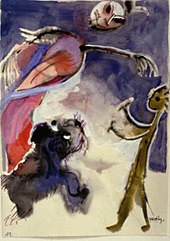
Margret Hofheinz-Döring: The Pudel's Core
The Other Sex
The Other Sex (French: Le deuxieme sexe; literally: The Second Sex) is the title of a famous book by Simone de Beauvoir, in which she deals with the demands and problems of women's emancipation. The title temporarily became the catchword of women's emancipation and is also used to refer to "the women" in general.
The basis of the scripture is the thesis:
"You are not born a woman, you become one."
The Munich philosophy professor Hans-Martin Schönherr-Mann published a book on the 50th anniversary, which he gave the title Simone de Beauvoir and the Other Sex, and in it raises the provocative question: "Is emancipation failing?"
Combining the pleasant with the useful
This expression goes back to the poetry of the Roman poet Horace:
"Omne tulit punctum qui miscuit utile dulci."
"The applause of all has been won by those who have mixed the pleasant with the useful."
Horace speaks of poets and their works:
"Horace says that the perfect artist is he who mixes the useful into the pleasant; but it is more in accordance with the highest purpose of the arts to reverse this proposition, and to hold him to be the true artist who mixes the pleasant into the useful."
Today, the phrase is used quite generally in reference to pleasant things that also have a utilitarian aspect:
- "According to the motto 'combining the pleasant with the useful'".
- "Combine the pleasant with the useful!"
- "After retirement, you can combine the pleasant with the useful even more."
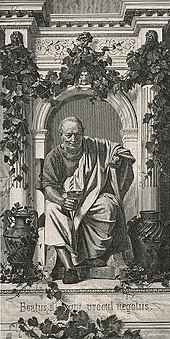
Horace as portrayed by Anton von Werner
Someone other than me understands that
This quote comes from the opera Zar und Zimmermann by Albert Lortzing. The pompous mayor of Saardam van Bett has to learn that, among other things, he also suspected the Russian envoy of being a "traitor to the state":
van bed
(to Lefort)
"Answer me, who art thou? Speak!"
Lefort
Envoy of the Emperor of all the Russias,
Admiral Lefort they call me.
van bed
Oh my goodness! What is this?
Someone other than I can understand that.
The better is the enemy of the good
Also: "The better is the enemy of the good." The French philosopher Voltaire (1694-1778) popularised this Italian proverb. The proverb is used in two opposite meanings:
- Something is only good until it is surpassed by something better, one should always strive for better.
- One should be content with what is good and not always strive for better; the incessant striving for better makes one blind to what is good.
The little bit of household
→ Main article: The little bit of household ... says my husband
Das bisschen Haushalt is a hit song sung by the actress Johanna von Koczian in 1977 that began with the following verses:
The little bit of housekeeping takes care of itself, my husband says.
The little bit of housekeeping can't be that bad, says my husband.
How a woman can complain at all is
incomprehensible, my husband says.
The song was very successful and ironically picked up on common clichés. Dieter Thomas Heck, the presenter of the ZDF Hit Parade, allowed himself the joke and swept the studio stairs during the song.
The song title is quoted again and again when it comes to the topic of the budget:
- "The Little Bit of Household" (exhibition at the Wels City Museum)
- "Eichel's number games: The little bit of budget." (Federal Budget of the German Finance Minister Hans Eichel)
The bread of the early years
The Bread of the Early Years is the title of a story by Heinrich Böll published in 1955. In the story, bread has become a symbol for the hero, who lived his youth with deprivation in the post-war period, and he judges his fellow human beings according to whether they are capable of sharing their bread with others.
Böll himself summarised the narrative with the following words:
"It's the story of a young man who is now 24, was 13 or 14 at the end of the war, comes to town, starves at first, but then 'gets in on the action', sets his sights on a career, even makes it - and then is pulled in a different direction by love for a young girl."
The story was filmed in 1961 by director Herbert Vesely from a screenplay by Böll and Leo Ti.
The words Das Brot der frühen Jahre (The bread of the early years) are the title of an article about the young Jürgen Klinsmann, the son of a baker, in the newspaper Der Tagesspiegel.
The critical bread of the early years is the headline over an article on the life of the art historian Carl Einstein.
This is the curse of the evil deed
The quote
That is the curse of the evil deed,
that it must always give birth to evil.
comes from Friedrich Schiller's tragedy The Piccolomini (V, 1).
Here Schiller paraphrases a quotation from Aeschylus' tragedy Agamemnon (V 757-758):
Τὸ δυσσεβὲς γὰρ ἔργον
μετὰ μὲν πλείονα τίκτει, σφετέρα δ' εἰκότα γέννᾳ.
To dyssebes gar ergon
meta men pleiona tiktei, sphetera d' eikota genna.
For the evil deed begets rampantly,
And produces a generation of evil deeds like the father.
See also: The Curse of the Evil Deed and Curse of the Good Deed
The eternal
The quote is from Friedrich Schiller's tragedy Wallenstein's Death. In his soliloquy, Wallenstein hesitates to apostatise from the emperor because he realises:
It is an invisible enemy whom I fear,
Who resists me
in the breast of man,
Through cowardly fear alone dreadful to me.
Not what proclaims itself vividly, powerfully,
Is the dangerously fearful. It is all that is common
, eternally yesterday,
What always was and always returnsAnd
tomorrow is valid, because it was valid today!
In those days, the eternal past meant the habits to which people clung. Today, when someone is called a diehard, they are criticised for their stubborn adherence to what has survived.
The Eternal Feminine
This expression comes from Goethe's drama Faust II, and with it the Chorus mysticus concludes Faust's redemption with the words:
All that is transient is
but a parable;
The inadequate,
here it becomes
an
event;
The indescribable,
here it is done;
The eternal feminine draws
us up.
The designation "the eternal feminine" ties in with the immediately preceding invocation of the "Virgin, Mother, Queen and Goddess", by which the Virgin Mary is probably not meant ("Goddess"!), but the virgin mother of all nature and goddess with the mural crown, the birthing, nourishing and murdering Diana (Magna mater) of Ephesus, to whom Goethe felt particularly attached.
Ringelnatz parodies this line in his poem "Klimmzug".
The parody "The eternal feminine drags us down" is also common.
Let it be the whole of Germany
What is the German Fatherland? The text was written by Ernst Moritz Arndt before the Battle of Leipzig in 1813. In view of the French occupation of many German territories at the time, it has a strong anti-French slant, which can be explained by the fact that it was written during the wars of liberation.
"What is the German fatherland?
Is it Prussia? Is it Swabia?
Is it where the vine blossoms on the Rhine?
Is it where the seagull flies along the Belt?
Oh no, no, no!
|: His fatherland must be greater!:|"
On the occasion of the victory over Napoleon and the entry of Blücher's troops into Paris, the song was first performed in Berlin in 1814. As the melody did not find favour with the audience, the song failed to make an impact. Gustav Reichardt composed the new melody in 1825. Afterwards, the song was used by parts of the German population alongside the Deutschlandlied as a national song of the unification movement.
August Heinrich Hoffmann von Fallersleben wrote a biting parody entitled "Wo ist Vetter Michels Vaterland?" after the failed German Revolution in 1849.
The dangerous age
This expression was popularised by a novel published in 1910 by the Danish author Karin Michaëlis entitled Den farlige alder, which, however, refers to a woman in menopause and describes her problems.
Melitta Walter writes about the author and her book:
"With the book Das gefährliche Alter (The Dangerous Age), which is only 182 pages long, she succeeded in dealing with the climacteric of women in such an emotional and honest way for her time that a storm of indignation broke out, especially from bourgeois women and frightened men. Then this Mrs Michaelis dared to write about the female longing for sexual satisfaction, about the self-determined separation from the husband and the eternal struggle for personal freedom."
Today, the dangerous age is jokingly used to describe the middle age of men, when they are more prone to love adventures. Männer im gefährlichen Alter is a German rogue comedy from 2004. The Hamburger Abendblatt headlines an article about Ildikó von Kürthy's novel Blaue Wunder with the following words:
"The dangerous age: Either I worry - or I eat!"
It goes its socialist way
This saying was common in the GDR to express that something was proceeding according to plan and tended to be rather protracted. It refers to the inflationary use of the word socialist in formal language in the GDR ("the socialist national economy", "the developed socialist society", "our socialist homeland", "with a socialist greeting").
It is also the title of a song with which Wolf Biermann performed at his legendary Cologne concert on 13 November 1976. Three days after the concert, the East Berlin news agency Allgemeiner Deutscher Nachrichtendienst reported that Biermann had been stripped of his citizenship.
In his laudation of Biermann on the occasion of the award of the Grand Cross of the Order of Merit of the Federal Republic of Germany on his 70th birthday, the German Federal President Horst Köhler said on 15 November 2006:
"After all, not everything goes 'its' socialist way' when people take history into their own hands. And you, of all people, have experienced often enough that you are never immune to surprises. Today you are celebrating your birthday - and at the same time these days mark the anniversary of your expatriation from the GDR."
The expression "socialist gait" is used when talking about encrusted structures in socialist states, such as:
- "Cuba in transition. Everything goes its socialist way" (The time of Fidel Castro seems to be over - much speaks for his brother Raúl as successor)
It only happens once, it never happens again
This is the refrain of a hit song from the film The Congress Dances, which was filmed in 1931. The first two and the last two lines of the refrain are the best known:
This only happens once, it will never happen again, it'
s too good to be true!
Life can only give you this once,
because every spring has only one May!
The song was sung by Lilian Harvey in the role of the young glove-maker Christel Weinzinger, who experienced a romance with the Russian Tsar Alexander I during the Congress of Vienna. Weinzinger promotes her business by throwing a bouquet of flowers with her business card into every carriage that passes. In doing so, she hits the Russian Tsar Alexander on the head. At first she is accused of an assassination attempt. The Tsar falls in love with Christel and uses the calling card to visit her in her shop. A romance develops and the Tsar has her picked up in a magnificent carriage.
In 2000, these lines became very famous once again, as Expo 2000 used a rock version of the song in their commercials.
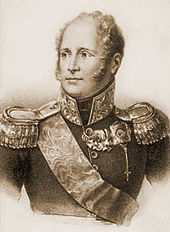
Tsar Alexander I
Happiness is a light strumpet
This quotation is the first verse of the motto that precedes the second book of Heinrich Heine's cycle of poems Romanzero:
Happiness is a light maidenAnd does
not like to stay in the same place;
She brushes the hair from your foreheadAnd
kisses you quickly and flutters away.
Frau Unglück, on the contrary, has held you close to her
heart;
She says she is in no hurry,
Sits by your bed and knits.
The topos of the impermanence of happiness appears here in the image of a prostitute; the topos of the persistence of unhappiness, on the other hand, in the image of the housewife or wife.
Listening to the grass grow
This expression refers to a superhuman sensitivity, but also to being able to perceive and know something better or earlier than others. The phrase supposedly goes back to an Old Norse doctrinal essay from the 13th century. The Younger Edda tells of the wise Heimdall, who was so perceptive that he could even hear the wool of the sheep and the grass grow. He could also see 100 roosts by day and night.
Heimdall was the guardian of the bridge Bifröst to Asgard. In case of danger he warned with the Gjallarhorn. He is also considered the ancestor of mankind.
The quotation collector Georg Büchmann quotes from the younger Edda in his Geflügelte Worte:
"He needs less sleep than a bird, and sees a hundred roosts by day as well as by night; he also hears the grass in the earth and the wool growing on the sheep, and therefore everything that makes a stronger sound.
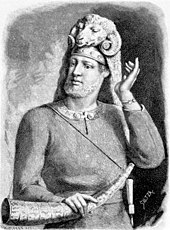
Heimdall
The Big Eat
Das große Fressen is the German title of the 1973 French feature film La Grande Bouffe, which caused a sensation because of its shocking depiction of a feeding frenzy. Four friends meet to commit collective suicide one weekend by overeating.
The film title soon became common as a name for events where the focus is on food, but also for economic affairs:
- "The big meal - protocol of an eating event".
- "Obesity in Britain - The Big Eat."
- "The big grub at the banks"
The biggest insect is the elephant
This absurd statement is one of the famous cathedrals of the pedagogue Johann Georg August Galletti.
Galletti was a grammar school professor in Gotha from 1783 to 1819. Friedrich Schiller is said to have declared him the "dullest and most witless historian who ever lived". He became famous for his slips of the tongue, which were allegedly collected by his students. The Ersch-Gruber encyclopaedia says of Galletti:
"He had in common with many other learned men the weakness that a distraction of mind seized him during lessons... These little defects were covered by the nobility of his mind and heart."
Fritz Eckhardt amended the quote as follows:
"The biggest insect is the elephant made from a mosquito."
The good - this sentence stands firm - is always the evil that one leaves
This statement comes from the closing words to the picture story Die fromme Helene by Wilhelm Busch. With these words, Busch restores order. The website of Bayerischer Rundfunk states:
"Max and Moritz end up as chicken feed, the pious Helene burns and finds herself back in the pit of hell. Good triumphs, but you sympathise with the villains."
See also: Golden Rule

Special stamp from 1982
The shirt is closer to me than the skirt
This saying goes back to a comedy by the Roman poet Plautus, in whose play Trinummus (The Three Drachms Play) it is called that in Latin:
"Tunica propior pallio est."
In German, the Roman lower garment, the tunic, is rendered as "shirt", while the Greek upper garment, pallium, which corresponds to the Roman toga, was translated as "skirt".
· 
Military tunic
· 
John Paul II with the modern form of the Pallium
This saying means that one's own advantage is more important than the interests of others. It corresponds to the proverb:
"It's every man for himself."
The German Federal Minister for the Environment, Sigmar Gabriel, said in his Bundestag speech during the debate on the 2005 government declaration:
"Environmental protection is justice and fairness in practice. All over the world, even in politics, far too much is done according to the motto "The shirt is closer to me than the skirt". In our modern language, the skirt would probably be the coat. The coat is the earth's atmosphere, the fresh water supplies, the soil, the forests and the oceans. The shirt is the way we heat, the kind of mobility we maintain and the products we buy."
Gabriel continues with the image:
"The people of Dresden on the Elbe, the people of Münsterland these days and the people of Harbin in China know that the shirt is only a thin rag as soon as the skirt gets a little tear. We must maintain and repair the skirt that belongs to everyone."
The heart has its reasons that the mind does not know
This aphorism comes from the philosopher Blaise Pascal, who wrote in French:
" Le cœur a ses raisons que la raison ne connaît pas. »
The highest of feelings
These words come from the second act of Mozart's opera The Magic Flute, in which Papageno and Papagena use them to express their anticipation of rich child blessings:
What joy that will be,
When the gods consider us,
Give children to our loveGive
children to
our
loveSo
dear little children, little children,
Little children, little children,
So dear little children.
First a little PapagenoThen a
little Papagena,
Then another PapagenoThen
another Papagena,Papageno
, Papagena, Papageno, etc.
It is the highest of feelings,
When many, many, of the pa-pa-pageno(a)
The parents' blessing will be. If many,
many, of the pa-pa-pageno(a)
The parents' blessing will be. etc.
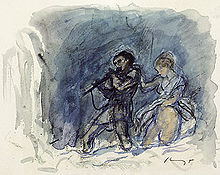
Max Slevogt: Papageno
The highest happiness on earth
The alleged "Arabian proverb" often quoted by riders comes from the German poet Friedrich von Bodenstedt, who wrote the following in his "Songs of Mirza-Schaffy" in 1851:
The paradise of the earthLies on the
back of the horses,
In the health of the bodyAnd
at the heart of the woman.
Opponents of equestrianism have turned the saying around to the horses' benefit:
The highest happiness of horses is
the rider on earth.
The Song of Songs
The Song of Solomon is a collection of popular love songs in the Old Testament. The German name goes back to Martin Luther. The Hebrew name Shir ha Shirim literally means "Song of Songs". The title in other languages also corresponds to this:
- Ἄσμα Ἀσμάτων (asma asmatôn) in the Greek Septuagint
- Canticum Canticorum in the Latin Vulgate
- Song of Songs (English)
- Cantique des cantiques (French)
Today, this title is used to denote something that is symbolically in praise of something:
- "Steve Ballmer sings the high song of security".
- "The high song of democracy"
- "The High Song of Hospitality"
Michael Preiner uses the expression high song of politics in his commentary on the election campaign for the US presidency:
"Oh you blessed Obama, why aren't you German and available as the next candidate for chancellor. We would cheer you, we would vote for you with the fervour of conviction and we would sing the high song of politics for you, at least until 4 weeks after the election, because then you too would have to make decisions and policies."
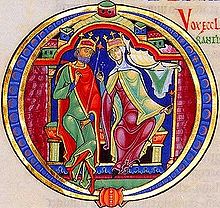
Illustration from the 12th century
The Empire Strikes Back
Das Imperium schlägt zurück (The Empire Strikes Back) is the German title of the 1980 US science fiction film The Empire Strikes Back, the fifth part of the Star Wars series. After the destruction of the Death Star, the rebels had to flee Yavin IV and look for a new base.
The film title is also referred to economic empires when they take countermeasures on any issue.
This is the misfortune of kings, that they do not hear the truth
These words were spoken by the politician Johann Jacoby in 1848 as a member of a delegation to the Prussian National Assembly to King Frederick William IV. The same idea can already be found in Johann Gottfried Herder's rewriting of the Spanish epic El Cid:
"Alas, the kings' hard fate,
That when they are no longer feared,
Then only to them the truth is spoken!" -
"Even at other, other times, the
truth is told to them,
But they, they do not hear."
This is the beginning of a wonderful friendship
In the 1942 US film Casablanca, the bar owner Rick says to the French officer Louis Renault:
"Louis, I think this is the beginning of a beautiful friendship."
"Louis, I think this is the beginning of a wonderful friendship."
Shortly before, Rick has shot Major Strasser at the airport, who was trying to notify the control tower. Renault (although a witness to the crime) instructs the arriving police to arrest "the usual suspects" and thus sides with Rick.
This last sentence from the film is usually quoted jokingly or ironically, for instance when a relationship is looming that you wouldn't exactly call friendly.
That is the curse of our noble house: To strive in half ways and half deeds with half means hesitantly
That is the curse of our noble house:
Halfway and halfway to action.
To strive procrastinatingly with half means.
Yes or no, there is no middle ground here.
Franz Grillparzer, A Brotherly Dispute in Habsburg, Act 2
Mostly this quotation is shortened to Auf halben Wegen und zu halber Tat.
This is the epidemic of our time: madmen leading the blind.
"This is the epidemic of our time: madmen leading the blind."
is a saying from William Shakespeare's tragedy King Lear (IV, 1); in the English original it says
Tis the times' plague, when madmen lead the blind.
This is the sun of Austerlitz!
As the sun rose on the Moskva on 7 September 1812, Emperor Napoleon Bonaparte called out to his officers in French:
"Voilà le soleil d'Austerlitz! »
In doing so, he recalled the victorious Battle of the Three Emperors between Brno and Austerlitz of 2 December 1805, in which he had defeated the Austrian and Russian troops under Emperor Francis II and the Russian Tsar Alexander I. On the evening of 1 December, the cloudy overcast weather changed to a cloudless night. On 2 December, dense ground fog prevailed, which only gave way to the legendary sun of Austerlitz. The sun breaking through the clouds allowed an overview of the fighting, which contributed decisively to Napoléon's victory.
The Russians under Kutuzov engaged in battle in front of Moscow. Napoleon won the battle of Borodino, but it was one of the most costly conflicts of the Napoleonic wars.
Later, this exclamation was occasionally quoted with similar encouraging intent in the face of a difficult situation.
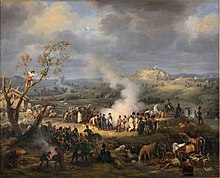
Louis-François, Baron Lejeune: The Battle of Austerlitz
This is Lützow's wild, daring hunt
These words come from the song Lützows wilde Jagd, which Theodor Körner wrote in 1813 during the wars of liberation and whose six stanzas all end with this line. In the setting by Carl Maria von Weber, the song is still part of the repertoire of male choirs today. It begins with the following stanza:
What shines there from the forest in the sunshine?
Hear it roar nearer and nearer.
It descends in gloomy rows,
And shrill horns resound therein,
Filling the soul with dread.
And if you ask the black fellows:
This is
Lützow's wild, daring hunt.
The Freikorps of Baron Ludwig Adolf Wilhelm von Lützow did particularly well in the wars of liberation. Lützow's Black Hunters owed their fame above all to their prominent members, such as the poet Theodor Körner, who fell in 1813. Other famous members were: the gymnast Karl Friedrich Friesen, the "gymnastics father" Friedrich Ludwig Jahn, Joseph von Eichendorff, the most important poet of German Romanticism, and the later founder of kindergartens Friedrich Fröbel.
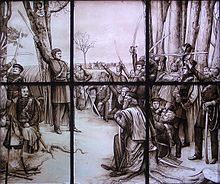
Theodor Körner recites his sword song to his comrades.
This is more than a crime, this is a mistake
When Napoleon Bonaparte executed the Duc d'Enghien, who had fought against the Republic, Talleyrand (or the Minister of Police, Joseph Fouché) said:
"C'est pire qu'un crime, c'est une faute."
Napoléon had the Duke Enghien shot after a mock trial as an "emigrant paid by foreign countries to facilitate an invasion of France". The kidnapping and execution caused outrage throughout Europe, but was also a deterrent signal to Napoléon's opponents. This action damaged Napoléon's foreign policy. Napoleon had previously rejected a plea for clemency delivered by Joséphine de Beauharnais.
Domestically, however, Napoléon had stifled all royalist plots with this "terrorist execution" (Louis Bergeron) and had the approval of the broad population behind him. Significantly, in response to the outrage abroad, Napoléon himself only barely said:
"I am the French Revolution."
In Talleyrand's words, one expresses that one considers an action to be imprudent.
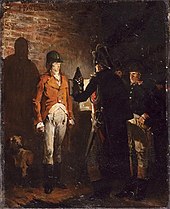
The execution of the Duke of Enghien
Surely this cannot shake a sailor
These words are the reciprocal rhyme from a hit song sung in the 1939 film Paradise of the Bachelors with Heinz Rühmann. The lyrics are by Bruno Balz, the setting is by Michael Jary:
That can't shake a sailor,
Don't worry, don't worry, Rosmarie!
We won't let life make us bitter, Don't worry, don't worry,
Rosmarie!
And when the whole earth shakes,
And the world is unhinged ...
That can't shake a sailor,Don't be afraid, don't be
afraid, Rosmarie!
The film is about three hard-drinking men who live in a shared flat. The refrain is quoted as an expression of unwavering optimism.
No pig can read that
Marcus Swyn († 1585) was ducal bailiff of the northern third of Dithmarschen. After the end of the peasant republic in Dithmarschen, all property documents were to be certified by the bailiff. If the papers had become illegible, it was noted: "Not even a Swyn can read that. - Dat kann keen Swyn lesen."
However, there is also another interpretation. This is what the Deutschlandradio website says:
"Even in the early modern period, there were many funny depictions of animals at school, and donkeys and pigs were popularly used. The pig in particular could theoretically hold a pen and write with its claw. The way to the expression 'sow's claw' was not far away."
Calling a spade a spade
This saying has been around since the 17th century and became famous through Goethe's drama Faust I. Faust points out to his famulus Wagner that it can be dangerous to share one's insights openly:
Yes, what one is called by that name!
Who may call the
child by its right name? The
few who recognised it, Who
foolishly enough did not keep their full heart,
Revealed their feeling, their vision to the mob,
Have ever been crucified and burned.
The Child in the Man
This expression goes back to Friedrich Nietzsche's work Also sprach Zarathustra. In the chapter Von alten und jungen Weiblein (Of old and young women) we find the following statement:
"There is a child hidden in the real man who wants to play. Come on, women, discover for me the child in the man!
Men often use the child in the man to justify their playfulness, while women use it to comment on male behaviour that seems childish to them.
The Lesser Evil
The expression goes back to the philosopher Plato, who has Socrates say in his dialogue Protagoras:
"Of two evils, no one will choose the greater if he can choose the lesser."
The art silk girl
The art-silk girl is the good-natured, ever-in-love and slightly dissolute stenographer Doris in the novel Das kunstseidene Mädchen (The Art-Silk Girl) by the writer Irmgard Keun, published in 1932. Doris is somewhat reminiscent of artificial silk, of which she herself says:
"You should never wear artificial silk with a man, it crumples so quickly, and then how do you look after seven real kisses and counter-kisses?"
Seeking the land of the Greeks with the soul
These words come from the opening monologue of Goethe's play Iphigenia on Tauris. Iphigenia laments her fate, far from her homeland:
For ah, the sea separates me from the beloved,
And on the shore I stand for long days,
Seeking the land of the Greeks with my soul.
This winged word was frequently quoted, especially in the 18th century, when interest was diverted from Roman to Greek antiquity.
The land where milk and honey flow
This image comes from the Old Testament, where God says to Moses with reference to the Israelites, for example:
"...and I came down to deliver them out of the hand of the Egyptians, and to bring them out of this land unto a good land and a large, unto a land flowing with milk and honey."
(In total, this phrase is used 21 times in the Old Testament).
This expression is usually used jokingly to describe a place where everything is in abundance. It also serves as an antonym for the land of milk and honey. However, the plural would be expected: "...where milk and honey flow".
Life is not a pony farm
The saying, which has been appearing in everyday German language since around the 2000s, points to the harsh realities of life and warns against naïve illusions, has made an appearance as the title of an album by the German punk band the Schröders from 2001, among other things. A webcomic series by author Sarah Burrini, which has been published since 2009, also bears this title. The saying also appeared repeatedly in the TV series Stromberg. A Facebook page with the saying had around one million likes in January 2016.
Instead of "pony farm", the quotation has been used before with terms such as "girls' boarding school", "wishful thinking", "sugarcoating" or "picnic". In 2009, the short story collection Das Leben ist keine Waldorfschule by the German author Misha Verollet was published.
A slightly more optimistic variation is: "Life is a pony farm and the stable needs to be mucked out."
Life is short, art is long
"Life is short, art (lasts) long." is the beginning of the aphorisms published under the name of the Greek physician Hippocrates of Kos. In Latin, this sentence lives on under Vita brevis, ars longa and was handed down by the Roman poet Seneca in his writing "De brevitate vitae" - "On the brevity of life". There it says in 1,1:
"The greater part of mortal men, Paulinus, complain of the disfavour of nature, that we are born for but a short time of life, and that so swiftly and tumultuously does the term of life given us expire, and in such a manner that, with the exception of a few, life forsakes the rest even in the preparation of it. And over this general evil, it is thought, not only the great masses and the ignorant rabble sigh."
It is not only the medical art that takes a long time to reach perfection.
This is the Berlin air
These words come from the operetta Frau Luna by Paul Lincke, which tells of Berliners who landed on the moon and were arrested by moon guards. They remember their native Berlin air:
This is the Berlin air, air, air,
with its lovely fragrance, fragrance, fragrance.
Berlin air is synonymous with the social and cultural climate in the city of Berlin.
The next game is always the hardest game!
This well-known statement comes from a circular letter written by the German national football coach Sepp Herberger to the national players on 20 August 1954. This sentence is often quoted in a slightly modified form:
"The next game is always the most important."
Another sentence by Herberger can also be seen in this context:
"After the game is before the game."
The football player and coach Matthias Sammer varied Herberger's sentence to:
"The next game is always the next game."
After the World Cup triumph at the 1954 Football World Cup, the heroes of Bern were celebrated at home for weeks. Herberger was worried about the fitness of his players during all the honours and receptions. Already at the World Cup victory celebration in Munich, he said to striker Hans Schäfer:
"Hans, don't drink so much, in eight weeks we have a tough game in Brussels against Belgium."
Herberger wanted to bring his players back down to earth and make it clear to them that they should not rest on their laurels. The title holders then lost to Belgium 0:2 in front of 70,000 spectators in Brussels.
The journalist Christoph Biermann later called Herberger's wisdom Herbergerisms.

Sepp Herberger on a stamp
The horse does not eat cucumber salad
To test the transmission quality of the first telephone set he developed, Philipp Reis contacted a friend. The words were not to be guessed in case they arrived imperfectly. The story goes back to a teacher colleague who describes in his memoirs a demonstration in the Reis house: Reis' brother-in-law was reading a book over the phone in the garden, Reis repeated aloud to the audience the text he had eavesdropped on the recipient. The colleague countered that he might know the book by heart:
"That's why I myself went into the room where the phone was and spoke a few phrases like 'The sun is copper' or 'The horse won't eat cucumber salad'."
Rice didn't understand exactly what the horse was eating and thought the sun was made of sugar, but the colleague was still convinced.

Replica of the telephone by Philipp Reis
The principle of hope
The Principle of Hope is a three-volume work by the German philosopher Ernst Bloch, who wrote it between 1938 and 1947 in exile in the USA. Originally, his main work was to be called "The dreams of a better life".
- The first volume comprises "Little Daydreams" (report), the philosophical centrepiece "Anticipatory Consciousness" (groundwork) and "Desired Images in the Mirror" (transition).
- The second volume analyses the "Grundrisse einer besseren Welt" (Construction).
- The third volume "Wunschbilder des erfüllten Augenblicks" (Identity).
The cunning beast did it for the sake of rhyme
This is the last line of the nonsense poem Das ästhetische Wiesel by Christian Morgenstern:
A weasel's seat
on a pebble in the middle of a
trickling stream.
Do you know why
?
The mooncalf told
me in
silence:
The cleverest
animal did it for
the sake of rhyme.
The quote is usually used to comment on courses of action that one cannot comprehend.
The round has to go into the square
This quote is also said to have come from football coach Sepp Herberger, who wanted to express laconically that the goal of a football match is to get the round ball into the square goal. But the originator was former Bundesliga coach Helmut Schulte, who said in highly simplified language:
"Ball round must go into goal square."
The author Helmut Schümann called his book on the history of the Bundesliga Das Runde muss ins Eckige (The round has to go into the square) and thus picked up on this much quoted phrase from sports journalism.
The title of a study by Controlling Professor Jörn Littkemann at the Fernuniversität Hagen is "Das Runde muss ins Eckige - FernUniversität: Fußball als Wirtschaftsfaktor". It states:
"But whether it's the Bundesliga, the Uefa Cup or the European Championships, a number of conditions have to be met for the round to go into the square, even some that have little to do with sport at first.
The destiny of man is man
These words are spoken in Bertolt Brecht's play The Mother by the mother of a young communist who was killed. They want to explain to her that man cannot do without God, especially in suffering:
"Mrs. Vlasova, man needs God. He is powerless against fate."
To which she replies:
"We say that man's destiny is man."
Here Brecht reformulates a thought by Karl Marx, who wrote in the introduction to his Critique of the Hegelian Philosophy of Right that man is the highest being for man.
Fate puts the plane to work
In the magic fairy tale with song Der Verschwender (The Prodigal), written by Ferdinand Raimund in 1834, the master carpenter Valentin sings the famous Hobellied. In it, with regard to the difference between rich and poor, it says at the end of the first stanza:
People often argue about
the value of happiness,One
calls the other stupid,In the
end no one knows anything. The
poorest man is
far too rich for the other:
Fate sets the plane to workAnd
planes everything the same!
Being determines consciousness
This is a common abbreviation of a quote by Karl Marx, who writes in the preface to his Critique of Political Economy that the conditions of production result in a certain consciousness:
"It is not the consciousness of people that determines their being, but conversely their social being that determines their consciousness."
This looks very clear
With these words, the main character in Loriot's film Oedipussi describes the meagre but noble meal in a fine French restaurant, diplomatically expressing his disappointment at the modest portion sizes in the gourmet restaurant.
The phrase has now become an idiom used in comparable situations.
These are the practitioners of the world....
"Those who changed over night, / Who profess every state, / These are the practitioners of the world, / You might as well call them rags."
These mocking verses by Bogislav von Selchow on the supporters of the Weimar Republic were held up - with the softening of "different" in place of "lumpen" - to Finance Minister Otto Klepper in the session of the Prussian parliament on 16 December 1931 by the German Nationalist MPs Hansjoachim von Rohr and Joseph Kaufhold. In his memoirs Im Zeugenstand der Geschichte - Antworten zum Thema Hitler (In the Witness Stand of History - Answers on the Subject of Hitler), the Gauleiter Rudolf Jordan reports that "as early as 1933, [in order] not to extend too friendly a welcome to the onrushing post hunters, [...] in the entrance to the Gauleitung in Halle he greeted the many bourgeois souls who were hurrying after the victory and now finally wanted to be there with the wall slogan by Bogislaw von Selchow". The fact that, seventy years after the fall of National Socialism in Germany, this is still considered a catchphrase makes one wonder.
The game is off
Das Spiel ist aus is the German title of the French feature film Les jeux sont faits from 1947, based on a screenplay by Jean-Paul Sartre. The title quotes the announcement of the croupier at roulette:
" Les jeux sont faits, rien ne va plus. »
"The game is over, nothing works anymore."
For the two main characters from the realm of the dead, a return to life is not possible because they do not succeed in realising their love in one day.
The miller's delight is to wander
The question of why millers, of all people, should have a particular penchant for hiking is answered automatically when you know that the lyrics to this folk song were written by the poet Wilhelm Müller.
The song begins with the following verses:
The wandering is the miller's delight...
This must be a bad miller,
who never thought of wandering...
The Word for Sunday
Das Wort zum Sonntag is one of the oldest television programmes on ARD. On Saturday evenings, it features short ecclesiastical reflections by a representative of the two major Christian denominations.
The title is quoted in the sense of a serious exhortation.
The miracle is faith's dearest child
This sceptical sentence is a quotation from Goethe's Faust I and immediately follows the words with which Faust states his loss of faith:
"I hear the message, but I have no faith."
In a sermon on Mark 8:22-26 in August 2007, Wilfried Härle takes up this Goethe quote:
"'The miracle is faith's dearest child', Goethe has his Faust say. That may have just been true 200 years ago when these words were written, although by the end of the Enlightenment era, belief in miracles had already become quite questionable and problematic for many people. In the meantime, many people - outside and inside the churches, under and in the pulpit - have rather difficulties with the miracle narratives, even with those that are abundantly handed down in the New Testament. From being the most beloved child, miracles have at any rate in our Central, Western and Northern European cultural circle rather developed into the stepchild, or more precisely (since stepchildren can also be very beloved children) into the unloved one of faith."
The goal is nothing, the movement everything
This maxim of the workers' movement, which wanted to achieve socialism not through revolution but exclusively through a policy of social reform, was thus first formulated in 1897 by the social democratic theorist Eduard Bernstein in the journal Die Neue Zeit.
Franz Walter shows how controversial this sentence was under the heading How Bernstein made the SPD shake:
"The storm of indignation did not break out until 1898, when Bernstein wrote a sentence that is famous to this day on the left, infamous to many: "I confess it openly, I have extraordinarily little sense for what is commonly understood by the 'ultimate goal of socialism'. This goal, whatever it may be, is nothing to me, the movement everything.""
This was followed by half a decade of bitter dispute, which bears the historical name Revisionism Controversy.
Today, Bernstein's words are used as a rebuke when the dispute over direction in a political grouping has become more important than the common goal.
That the soft water in motion over time defeats the mighty stone
These verses come from Bertolt Brecht's poem Legend of the Creation of the Book of Taoteking on the Way of Laozi into Emigration. It tells how the ancient Chinese philosopher Laozi, on his way to emigration, meets a tax collector who wants to know what insights his reflections on the world have led to. When he asks, "Did he get anything out of it?" he gets the answer:
That the soft water in motionWith
time defeats the mighty stone.
You understand that the hard is defeated.
The source is probably the Latin proverb Gutta cavat lapidem non vi sed saepe cadendo. In 1986, the futurologist Robert Jungk published a volume of essays entitled Und Wasser bricht den Stein.
Standing there like Buridan's donkey
This phrase means that someone cannot decide between two things of equal value and refers to a parable attributed to the medieval French philosopher Johannes Buridan, according to which a hungry donkey would starve to death from indecision before two equal bundles of hay. The basic idea comes from the Greek philosopher Aristotle's On Heaven and is taken up in Buridan's commentary using the example of a dog. The term Buridan's donkey was possibly invented by Buridan's opponents.
It's not the end of the world
With these words begins a hit song sung by Zarah Leander in the 1941/1942 film Die große Liebe. The film tells the love story between an air force officer and a famous vaudeville singer and was one of the "hold-out films" intended to distract people from the events of the war. The refrain of the song begins with the following verses:
It doesn't end the world,
sometimes you see it grey.
Once it becomes more colourful again, once it
becomes sky-blue again.
Bruno Balz wrote the song together with "Ich weiß, es wird einmal ein Wunder gescheh'n" in the summer of 1941 at Gestapo headquarters in Prinz-Albert-Strasse, or Christmas 1941, in the 24 hours after his release from prison following the intervention of his writing partner Michael Jary. One could interpret the text as one wished: Either the world will not end from the hail of bombs or from the "evilness of the Nazis".
De gustibus non est disputandum
The Latin phrase "De gustibus non est disputandum" means "One should not argue about taste". However, the phrase does not originate from antiquity. The French gastrosophist Jean Anthelme Brillat-Savarin derived this phrase from Spanish, where it says:
"Sobre los gustos no hay disputo."
Scholastic philosophy states:
"De gustibus et coloribus non est disputandum."
"You can't argue about tastes and colours."
Just as there are infinite shades of colour, there are also infinite flavours.
De mortuis nil (= nihil) nisi bene
This Latin saying goes back to the Greek sage Chilon of Sparta, who, according to Diogenes Laertius, is said to have said in Greek:
"Τὸν τεθνηκότα μὴ κακολογεῖν, γῆρας τιμᾶν. »
"Ton tethnēkota mē kakologein, gēras tīmān."
"Do not speak ill of the dead, honour old age."
In other words, if you don't know anything good to say about a dead person, then you shouldn't say anything at all about him.
The Latin saying is still used today, as in the following examples:
- "De mortuis nil nisi bene? - On Karl May's alleged mental disorder".
- "Edward Teller has died: De mortuis nihil nisi bene"
- "De mortuis nil nisi bene: This applies to the dead. But there is no need to spread half-truths about the living, certainly not at funeral ceremonies."
Your wish was the father of the thought
In the original English version of William Shakespeare's drama Henry IV, the King says to the Prince of Wales:
"Thy wish was father, Harry, to that thought."
Prince Harry had thought his father, who was asleep on his sickbed, was dead and had taken his crown to wear as his legitimate successor.
The saying is quoted today in the modified form "The wish was father of the thought" when one wants to imply that something is based on wishful thinking.
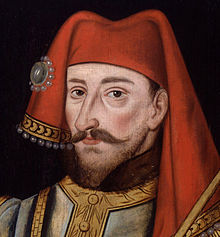
Henry IV
Déjà vu
Déjà vu experience [deʒaˈvy] (French: "already seen"; also memory illusion or déjà vu for short), also called déjà entendu phenomenon [deʒaɑ̃tɑ̃ˈdy] (French: "already heard") or déjà vécu experience [deʒaveˈky] (French: "already lived"). The term "already lived" refers to a psychological phenomenon that manifests itself in the feeling of having experienced, seen or dreamt a completely new situation in exactly the same way before. This is not a false perception, but a paradoxical emotional experience.
The term itself was coined by the French psychologist Émile Boirac in his book L'Avenir des sciences psychiques (The Future of the Psychical Sciences).
The opposite of the déjà vu experience, namely the feeling of strangeness in a familiar environment, is called a jamais vu experience [ʒamɛˈvy] (French: "never seen") and can occur in similar circumstances.
Well known to the Office
This old-fashioned formula was popularised by Heinrich von Kleist's comedy Der zerbrochne Krug (The Broken Jug), where Walter, the court councillor, abbreviates Judge Adam's awkward insistence on formalities with the following words:
Such questions are therefore superfluous.
Put her name in the minutes and
write: well known to the office.
The words are used jokingly today when you want to express that you know someone very well because they have already attracted disagreeable attention.
Far from the eye, near to the heart
This farewell formula, often used in connection with deaths, is found in the poem of the same name by Ludwig Jacobowski:
Far from the eye, near to the heart!
When I saw the old epitaph
In the sunken marble stone,
Then I remembered my dead love.
Oh God, I have written a thousand times
The same song from the same agony,
And yet there was none like this one:
Far from the eye, near to the heart!
The origin, however, is probably much older and not more closely known, and can therefore be attributed to the vernacular.
Nothing can be sworn to the engineer
This much-quoted phrase is put into the mouth (or beak) of the Disney character Daniel Düsentrieb by the translator Erika Fuchs. In the comic series, Daniel Düsentrieb is a genius inventor who probably reminded Mrs Fuchs of her husband Günter Fuchs, a factory owner and inventor. Günter Fuchs built everything in the house himself, right down to the furniture. When it came to technical things in the comic stories, Erika Fuchs consulted her husband:
"What he makes real and sane, I twist it back to make it a little crazy."
Her husband, however, was not only versed in technical matters, he was also a specialist in quotations from the classics. Her translations - unlike the English originals - contained countless hidden quotations and literary allusions.
The saying that is almost always referred to as their creation: "Dem Ingeniör ist nichts zu schwör" is a variation of the first line of Heinrich Seidel's Ingenieurlied from 1871:
"Nothing is too heavy for the engineer ..."
Giving to the emperor what is the emperor's
This expression goes back to a quotation from the Gospel according to Matthew, where Jesus, pointing to the coin with the image of the emperor, says in response to the Pharisees' question about the interest groschen:
"Render unto Caesar the things that are Caesar's, and unto God the things that are God's!"
Today, the expression is used in the sense of "fulfilling one's duty to the authorities".
The man can be helped
This sentence from Friedrich Schiller's drama The Robbers is often quoted in the form "The man can be helped".
With this statement, Karl Moor, who became a murderer and rebel against the social order, admits at the end of the play "that two people like me would ruin the whole structure of the moral world" and wants to turn himself in. Since there is a thousand louis d'or on his capture, he wants to give a poor day labourer with eleven children the opportunity to earn the bounty:
"One could admire me for that." (After some reflection.) "I remember speaking to a poor rogue when I came over, who works at day wages and has eleven living children - One has offered a thousand louis d'or who will deliver the great robber alive. The man can be helped." (He leaves.)
The thanks, lady, I do not desire
Friedrich Schiller's ballad Der Handschuh is about a questionable demonstration of love. A court maiden deliberately drops her glove into the arena with wild animals and then asks a knight who is courting her to fetch the glove. The knight does indeed enter the arena and retrieves the glove. But then he behaves differently than everyone expects:
And calmly he brings back the glove.
There his praise resounds from every mouth,
But with a tender look of love -He
promises him his near happiness -
Miss Kunigunde
receives
him.
And he throws the glove in her face:
"I do not desire thanks, lady",
and leaves her at the same hour.
We leave heaven to the angels and the sparrows
This verse comes from Heinrich Heine's cycle of poems Deutschland. A Winter's Tale. In it, Heine criticises the prevailing spirit in Restoration Germany. In the first poem, he opposes people's hope for a better hereafter:
"A new song, a better song,
O friends, I will compose for you!
We already
want to
build the kingdom of heaven here on earth.
...
Yes sweet peas for everyone,
As soon as the pods burst!
We leave heaven to the
angels and the sparrows."
Modesty adorns the youth
This quotation is a transposition of the words with which, in Franz Grillparzer's drama Die Ahnfrau, the youthful hero Jaromir is admonished by the old Count Zdenko von Borotin not to exaggerate his modesty:
Modesty adorns the youth,
he does not misjudge his worth!
Whether the joking saying "Modesty is an adornment, but one gets further without it" has its origin in this seems questionable.
All the livelong day
This expression is found at the beginning of Philipp Jacob Düringer's poem Des Mädchens Klage:
All day long
I have only pain and sorrow.
In the poem, the girl describes her grief for her deceased lover.
All is pure to the pure
"To the pure all things are pure" is a biblical quotation from the Letter to Titus. There the apostle Paul writes in Greek:
"Πάντα μὲν καθαρὰ τοῖς καθαροῖς-"
"Panta men kathara tois katharois;"
This is an exhortation to rebuke legal false teachers. Paul states that everything is pure for the pure, but nothing is pure for the unbelievers, because their attitude is also impure. Therefore, Christians do not need food, washing and clothing regulations.
The philosopher Friedrich Nietzsche reverses this sentence as follows:
"'All things are pure to the pure' - so say the people. But I say to you, to the swine all things become swine!"
The Lord gives it to His own in their sleep
"The Lord giveth to his own in his sleep" is a quotation from the 127th Psalm, a song of trust, and today is proverbial for children of fortune:
"1 A Song of Solomon in the higher chorus. Where the LORD buildeth not the house, they that build it labour in vain. Where the LORD keepeth not the city, the watchman watcheth in vain. 2 It is in vain that ye rise up early, and afterward sit down long, and eat your bread with sorrow: for he giveth his friends sleep."
To these lucky children, one sermon says:
"The Lord gives it to his own in his sleep' is a proverbial phrase for the lucky children on the sunny side of life. It just flies to them: the A's at school, the sympathy of fellow students at university, the hearts of women at parties, the recognition of lecturers in seminars and later success in the community. Such sunshine children usually don't need to do much at all. Sometimes they do nothing at all - and yet they succeed."
Neither ox nor donkey stops socialism in its tracks
This slogan is often attributed to the co-founder of the SPD, August Bebel, but there is no record of him using it. It was first recorded in the summer of 1886 as an anonymous guestbook entry at the Spindler Tower, which later became the Müggelturm in the outskirts of Berlin.
In 1989, Erich Honecker, Chairman of the GDR's Council of State, picked up on this phrase when the VEB Kombinat Mikroelektronik "Karl Marx" in Erfurt succeeded in producing a 32-bit microprocessor. Honecker's statement of 14 August 1989 appeared on the front page of the SED newspaper Neues Deutschland on 15 August 1989 and attracted attention because it was the only public appearance of the seriously ill Honecker between July and September. At the same time, 200,000 GDR tourists were in Hungary, many of whom did not want to return to the GDR.
Honecker, however, praised socialism and said "that the Western media's cries of triumph over the failure of the socialist conception of society are not worth the money spent on it".
Honecker repeated the slogan again on 6 October 1989 in his speech on the 40th anniversary of the GDR in the Palace of the Republic in the presence of Soviet General Secretary Mikhail Gorbachev. The phrase was now perceived by the public as a stubborn slogan of perseverance. Gorbachev's response is often quoted as "He who is late is punished by life." quoted. There is a cartoon on this by the Austrian cartoonist Horst Haitzinger.
The ox and donkey are attributed to the depictions of the Christmas story in the Gospel according to Luke. But the guest book entry of the Spindler Tower contains a reference to the Prussian Minister of the Interior Robert Viktor von Puttkamer, who was in charge of the persecution of socialists.
Not seeing the wood for the trees
This expression comes from Christoph Martin Wieland's verse poem Musarion, oder die Philosophie der Grazien, published in 1768:
"It's as if foolish people can't see the wood for the trees; they're looking for what's right in front of them, and the only reason they can't find it is because they're moving further and further away from it in a kind of snail's line."
The meaning of this turn of phrase is that too many details can obscure the view of the whole.
When I think of Germany at night...
"If I think of Germany at night, / Then I am deprived of sleep". is the beginning of Heinrich Heine's poem Nachtgedanken, which he wrote in 1843:
When I think of Germany at night,
Then I am deprived of sleep,
I can no longer close my eyes,
And my hot tears flow.
Today, the beginning of the poem is often used to criticise conditions in Germany. However, such criticism can only be read into Heine's poem on the surface. In fact, Nachtgedanken is very specifically about the fact that Heine - who lives in Paris - had not seen his elderly mother, Betty Heine, for twelve years:
Germany endures forever,
It is a healthy country,
With its oaks, its lime trees,
I will always find it again.
I don't long for Germany so much,
If my mother were not there;
The fatherland will never perish,
But the old woman can die.
The poem ends with the following verse:
Gottlob! durch meine Fenster brichtFranzösisch
heit're Tageslicht;
Es kommt mein Weib, schön wie der Morgen,
Und lächeln die deutschen Sorgen weg.
.jpg)
Heinrich Heine's mother Betty Heine
For all guilt is avenged on earth
In Goethe's novel Wilhelm Meisters Lehrjahre, the title character listens to the song of a harpist burdened with mysterious guilt who holds the "heavenly powers" responsible for his fate. The second stanza of the song reads thus:
You lead us into life,
You let the poor man become guilty,
Then you leave him
to torment;
For all guilt is avenged on earth.
For Brutus is an honourable man
The Roman politician and general Marcus Antonius says in William Shakespeare's play Julius Caesar in his famous funeral oration to Gaius Iulius Caesar:
For Brutus is an honourable man,
So are they all, all honourable men.
For Brutus is an honourable man.
They all are, all honourable.
At Caesar's corpse, Antony first shakes hands with the conspirators. But then he asks Caesar's ghost to forgive him for making peace with the conspirators. Marcus Iunius Brutus wants to speak to the people himself and justify Caesar's killing, but at the latter's request allows Antony to take the body to the forum and also speak there before the assembled crowd.
After Brutus' speech, the people at first consider Caesar a tyrant and the act justified. But then Marcus Antonius begins his incendiary speech against Brutus:
Fellow citizens! Friends! Romans! Hear me:
I will bury Caesar, not praise him.
What evil men do, that survives them,The
good is often buried with them.
So be it with Caesar! The noble BrutusHas
told you that he was full of imperiousness;
And if he was, it was a grievous offence,
And grievously Caesar has paid for it too.
Here, with Brutus' will and others'.
For Brutus is an honourable man,
They are all, all honourable.
With rhetorical skill he finally succeeds in turning the prevailing opinion and inciting the people to revolt against the conspirators.
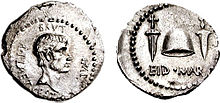
Denarius with the image of Brutus and the inscription "Ides of March" ("EID MAR coin")
Because one thing is certain: the pension
This slogan was put on election posters by the German Labour Minister Norbert Blüm in 1986. Since this statement is no longer believed, it has often been parodied and quoted since then. Twenty years later, for example, Hanno Beck wrote in the Frankfurter Allgemeine Zeitung under the headline "Because one thing is certain - the pension cut":
"Politicians should be reminded of their promises much more often: 'Because one thing is certain: the pension', Norbert Blüm put up a poster on the market square in Bonn. Later, the then Federal Minister of Labour and Social Affairs apparently had to earn a little extra on top of his own retirement benefits on the quiz show 'Was bin ich?', and he probably doesn't like to be reminded of his promise from back then."
It must be added, however, that this statement does not refer to either the retirement age or the pension amount. In September 2008, Blüm wrote under the headline "The pension was safe" in the SüddeutscheZeitung:
"Twenty years ago I said, 'The pension is safe'. Now one may add: Which one? Certainly not the stock market-oriented one! Of 112,000 pension funds in the United States, 32,000 have survived. Such a disaster has never happened to the pay-as-you-go pension system."
...for they know not what they do
"...for they know not what they do" is the German title of the US film Rebel Without a Cause with James Dean, which is about rebellious but also misunderstood teenagers.
The original English title could be translated as "rebel without a cause". Instead, its German version refers to the account of Jesus' crucifixion and the first of his seven last words:
"But others were led away, two malefactors, to be put to death with him. And when they came to the place which is called the place of the skull, they crucified him there, and the malefactors with him, one on the right hand, and one on the left. But Jesus said, 'Father, forgive them; for they know not what they do! ‘“
- Gospel according to Luke 23:24 LUT
The plot of the film hardly gave cause for such a reference. The German distributor, however, obviously wanted to tie in with the success of the previous James Dean film Jenseits von Eden (Beyond Eden) by using a biblical quotation again in the film's title, which alluded to Cain and Abel in Genesis (4:16 LUT): "So Cain departed from the presence of the LORD and dwelt in the land of Nod, beyond Eden, toward the east".
For what you have in black and white you can carry home with confidence
This quote, which has become a proverb, comes from Johann Wolfgang Goethe's drama Faust I.
Mephistopheles says there to the pupil:
So that you will see better afterwards
that he says nothing but what is written in the book;
but you will be able to write
as if the Holy Spirit dictates to you!
The pupil, who had previously said to Mephistopheles, "All this makes me as dizzy as if a mill wheel were going round in my head," now says:
You shall not tell me twice!
I think to myself how much it helps;
for what you have in black and white,
you can carry home with confidence.
The background is the idea that black ink or printer's ink written or printed on white paper is more permanent than the fleeting word that can be forgotten or forged.
The eagle has landed.
The words with which Neil Armstrong, as commander of the Lunar Module, announced the landing on the moon were:
"Houston, Tranquility Base here. The Eagle has landed."
"Houston, this is Tranquility Base. The eagle has landed."
However, the first words after the moon landing were different, some technical information was passed on by Buzz Aldrin and Neil Armstrong shortly before.
Tranquility Base was the landing site in the Mare Tranquillitatis (Sea of Tranquility). Eagle was the name of the Lunar Module (English: Eagle).
The Eagle Has Landed is a 1976 war film directed by John Sturges and based on the best-selling novel of the same name by Jack Higgins.

Apollo 11 Mission Logo
Appetite comes with eating
This saying comes from the French quote L'appétit vient en mangeant, found in François Rabelais' 1535 adventure novel about the two giants Gargantua and Pantagruel:
" L'appétit vient en mangeant; la soif s'en va en buvant. »
"Appetite comes with eating; thirst diminishes with drinking."
("Appetite comes in eating, says Angeston, but thirst is lost in drinking". Angeston is the wound physician Jerome of Hangest.)
Pantagruel, the son of Gargantua, stands out here for his particular voracity.
This expression is also used in a figurative sense, where "appetite" often means greed.
Totò, Neapolitan comedian and actor, had a different opinion: Si dice che l'appetito vien mangiando, ma in realtà viene a star digiuni, "They say appetite comes when eating, but in reality it comes when fasting."
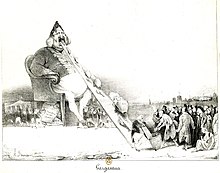
Honoré Daumier: Gargantua
The doctor helps, nature heals
"The physician helps, nature heals." or in Latin Medicus curat, natura sanat. is an aphorism that is probably already based on the teachings of the Corpus Hippocraticum.
The sentence should make clear,
- that the actual healing happens in the patient,
- that there is a natural course of the disease
- and that a good doctor takes the natural processes into account.
The ball is round
This much-quoted banal statement comes from the former German national football coach Sepp Herberger and is usually quoted in connection with other football wisdom, such as "A game lasts 90 minutes" and "The ball always has the best condition". The latter statement is meant to emphasise that it is better to let the ball "run" than to run after the ball yourself ("we let the ball run, it doesn't sweat").
Herberger also did not want to express that a football is a spherical structure, but that nothing is decided as long as the ball is rolling.
Thorsten Langenbahn writes in his book Die Populärsten Fußballirrtümer:
"For football ignoramuses, non-knowledgeable people and lubbers, however, the following applies despite all physical differentiations: 'The round is the ball!' This advice should be articulated as reproachfully as possible and with due emphasis by the knowledgeable public in the future, if necessary."
An exhibition in which the German Football Association paid historical-critical tribute to a century of its history in the Gasometer at CentrO Oberhausen was held under the motto The ball is round.
Der Ball ist rund is also the title of a Herberger biography by Karl-Heinz Schwarz-Pich, while Lothar Mikos and Harry Nutt called their Herberger biography Als der Ball noch rund war.
The Bundesliga coach Gyula Lóránt says of the above quote:
"The ball is round. If it were square, it would be a cube."
Coach Rudi Gutendorf says with regard to the peculiar behaviour of the play equipment:
"The ball is a sow dog."

Conventional football in honeycomb structure
The report of my death has been greatly exaggerated
When the US writer Mark Twain was on a lecture tour of Europe, a rumour spread in the United States that he had died suddenly. Mark Twain then cabled the following correction to America:
"The report of my death was an exaggeration."
Most often cited as:
"The report of my death has been greatly exaggerated."
The responsible newspaper man at the New York Journal countered calmly:
"What's printed is printed. We never take anything back. All we can do is put in a new birth announcement from you. Price: 1 dollar."
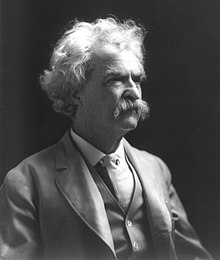
Mark Twain at the age of 72
He needs a long spoon who eats with the devil
In William Shakespeare's Comedy of Errors (1592-94), Dromio of Syracuse says to Antipholos of Syracuse in the Fourth Stuff, Third Scene:
"Now my soul, he needs a long spoon who eats with the devil."
Also in the variants Who eats with the devil needs a long spoon, He must have a long spoon, He who eats with the devil should be able to eat porridge or He needs a long spoon that eats with the devil, the Shakespeare quote (He has need of a long spoon that eats with the devil) became a winged word, often used in the sense of having got involved with the wrong people, for example in the case of the Brandenburg consistory president and later prime minister Manfred Stolpe, who was accused of having got too involved with the state security service in GDR times.
The bureaucrat does his duty
This statement comes from Carl Zeller's 1894 operetta Der Obersteiger. The play is set in southern Germany and begins at the princely Marienzeche mine. The following song text is found in the second act:
The bureaucrat does his duty from
nine to one.
That's all he does.
Zeller was a full-time ministerial councillor and head of the Arts Department in the Ministry of Education. With this text he expresses his view on the subject of civil service.
The only dung on which nothing grows is the pessimist
This statement on pessimism comes from former German President Theodor Heuss, alluding to the importance of manure as fertiliser in agriculture.
The banker Carl Fürstenberg said on the same subject:
"The optimist and the pessimist have one common denominator: bullshit."
... the tongues of women never rest.
Second line of the penultimate stanza from the ballad Die Sonne bringt es an den Tag by Adelbert von Chamisso. In it, Adelbert von Chamisso describes the story of Master Nikolas, who, out of need and anger, has slain a man during his wanderings. With his last ounce of strength, the latter gasps, "The sun will bring it to day." Whenever the sun shines, Master Nikolas murmurs to himself, "You're not going to get it." When his wife hears this, she presses him until he tells her about his manslaughter. Although he asks her to keep her mouth shut, she tells the story of the "Gevatterin". Thus the manslaughter becomes known. Master Nikolas is put on the wheel.
An alley for freedom!
It is said that Arnold Winkelried grabbed a bundle of lances from the Habsburg knights at the battle of Sempach in 1386 and, impaling himself, opened a breach for the Confederates. According to legend, he shouted beforehand:
"Take care of my wife and child!"
The better-known version of his last words, however, is "Der Freiheit eine Gasse!" (An alley for freedom!). …
... which became popular in the German national movement of the 19th century, such as in the refrain of Georg Herwegh's "Freedom Song":
Before the enemy stood in rank and fileThe
army with its bannersThere
cried Herr Struthan WinkelriedI
will clear
the way for youTo you
God I command wife and childI
leave on earthAnd
so he blows an arrow-winded
alley for freedom
That was a knight right with fug who
proudly like a thunderstorm
beat down the enemies before him.
o, if I were such a knighton a proud horse with a quick hoofin a
shimmering cuirassto
die with the thundering cryOut of the way for
freedom!
When all the world loses courage to
start a feud,
you, my people, let
your heart's blood flow to
the
nationsGive
us the man who will
seize
the banner of the
new ageand
through Europe we will break
a path for freedom!
You Germans level mountains and valleys for
your chariots of fire,You can
see them
chasing through the countries on
roads with no teethEven
this steam is sacrificial steamDon't think
that I hate itBut
first make a lane for
freedom in
quarrels and battles
When all the world loses its courage to
start a feud,
you, my people, let
your heart's blood flow to
the nations,
give
us the man who will
seize
the banner of the
new age and break
through Europe a
way for freedom.
Text published in: Georg Herwegh: Gedichte eines Lebendigen, Volume I (1841), which was first published anonymously in Switzerland.
This call is a quotation from Theodor Körner's poem Aufruf, published in 1813:
Rise up, my people! The flame signs smoke,
Bright from the north freedom's light breaks.
You shall plunge the steel into the enemy's heart; Rise up,
my people! - The signs of flame smoke,
The seed is ripe; you reapers, do not hesitate! The highest salvation, the last, lies in the sword!
Thrust the spear into your loyal heart:
'To freedom a lane!' - Wash the earth,
Your German land, with your blood pure!
Max von Schenkendorf's poem Schill's Ghostly Voice from 1809 still said:
And in the heart it has sounded, in the heart dwells the right!
Steel, wielded by a man's fist, saves only this generation. Therefore hold fast to hate, fight honestly, German blood!
'For freedom a lane!' thought a hero in the courage of death.
Franz von Papen's autobiography Der Wahrheit eine Gasse quotes Körner.
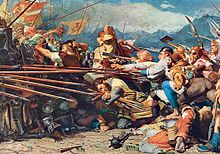
Konrad Grob: Winkelried's death at Sempach
The God Who Made Iron Grow
These are the opening words of the patriotic poem Vaterlandslied by Ernst Moritz Arndt, the first stanza of which reads thus:
The God who made iron grow
did not want servants
, so he gave the sabre, sword and spear to the
man in his right hand,
so he gave him the bold courage,
the anger of free speech, so
that he would endure
the feud to
the death.
Arndt wrote these verses immediately before the Coalition Wars of 1813-1815, which liberated Germany from Napoleon's rule. The composer Albert Methfessel was inspired by this text to write a martial melody.
Although Arndt's verses were inspired by hatred of Napoleon Bonaparte, no current political events are mentioned in the song's lyrics. Later, the song was re-purposed to Otto von Bismarck:
The God who made Bismarck
was kind to us;
when he blew the breath into him,
he wanted to unite us.
The Great Zampano
The Great Zampano (Italian: Zampanò) is one of the three main characters in the 1954 film La Strada - The Song of the Road by Italian director Federico Fellini.
Through this film character, the term Zampano has a negative connotation. Anthony Quinn plays a boastful man who loudly puts himself on stage and tries to convince his astonished fellow men that he can even make the impossible possible. Zampanò, a hulking showman, flaunts his strength in marketplaces, the highlight of his performances being when he bends a hook with the strength of his chest muscles.
Today, the term "Zampano" is often used as a synonym for someone who pulls all the strings. The expression "acting like the big shot" means as much as embodying the star in a certain scene. About Joschka Fischer, for example, it is said:
"The journalists Matthias Geis (Die Zeit) and Bernd Ulrich (Tagesspiegel) prove that the son of a butcher from the Württemberg province never took it easy morally on his winding march through the institutions from the great zampano of the left-wing radical Frankfurt spontaneous scene to the serious vice-chancellor and foreign policy paragon."
The Lord gave, the Lord has taken away
This resigned statement comes from the Old Testament book of Job, where the righteous sufferer Job (Job) says:
"The Lord gave, the Lord has taken away; the name of the Lord be praised!"
Job is struck with terrible suffering by Satan. He is portrayed as a pious man whose faithfulness to God is tested, for one day Satan comes before God and claims that Job's piety is only because God protects him and his possessions. God then allows Satan to test Job.
The biblical book deals with the question of how it can be that the just God tolerates evil happening to good people.
The eavesdropper on the wall hears his own shame'.
Anyone who tries to actively listen to what is being said behind a door or wall must expect to hear less than flattering things about themselves. This experience is also recorded in Wanders' German Dictionary of Proverbs.
See also: The eavesdropper on the wall hears his own shame.
Jürgen Klinsmann and me, we're a good trio
The Mannheim professional footballer Fritz Walter said in an interview:
"Jürgen Klinsmann and I are a good trio."
He then corrects himself a little later:
"I meant a quartet."
Born in Heidelberg, Fritz Walter played with Jürgen Klinsmann at VfB Stuttgart and was discovered and promoted by his namesake Fritz Walter, the 1954 World Champion, in Mannheim.
Walter made a similar slip of the tongue when he said to the press after a match:
"The paramedics immediately laid an invasion on me."
The captain is the last to disembark
"The captain is the last to disembark" or "the captain goes down with his ship" is a maritime rule and tradition according to which a captain has the ultimate responsibility for and must save his ship, crew and passengers.
The small difference
When people jokingly talk about the little difference, they usually mean the male member as a symbol of the difference between man and woman.
The expression comes from Erich Kästner's novel Fabian, published in 1931, where the exclamation "Long live the little difference!" alludes to the difference between men and women:
"She dragged Labude from his stool, gave him a kiss, knocked her hat on her head and, barely able to take his coat, dragged the young man to the door. 'Long live the little difference!" she cried. Then the two of them were gone."
The term became known primarily as the title of a book by the feminist Alice Schwarzer, who published a book in 1975 entitled Der kleine Unterschied und seine großen Folgen. In it, she advocates the so-called equality feminism, which was also advocated by Simone de Beauvoir. The book was translated into eleven languages and made Schwarzer the best-known figure of the German women's movement.
In 2002, she published a book entitled The Big Difference: Against the Division of People into Men and Women, in which - 25 years after her world bestseller - she asks what has happened in the meantime on the front of women's emancipation.
The Congress dances
The quotation was written in 1814 during the Congress of Vienna, when Vienna was the most important metropolis in Europe. The hosts of the congress endeavoured to make the stay of the high-ranking personalities as pleasant as possible. The succession of convivial events, balls and other amusements led Charles Joseph Prince von Ligne to coin the term "Dancing Congress". In a letter to Talleyrand dated 1 November 1814, Ligne wrote:
"I am credited with saying: 'The Congress dances, but it does not advance'. Nothing seeps through either but the sweat of these dancing gentlemen. I also believe I have said: 'This is a war congress, not a peace congress.'"
The quote is also used in the 1931 film of the same name, The Congress Dances.
The war feeds the war
War feeds war is a quotation from Friedrich Schiller's Die Piccolomini, the second part of the Wallenstein trilogy set in the Thirty Years' War. There, Schiller has Isolani, the general of the Croats (particularly notorious as plunderers), say in the first act:
War feeds war. If peasants die,
the emperor gains more soldiers.
War is the father of all things
This statement comes from the Greek philosopher Heraclitus, according to whom the principle of the world is that there is something constant that is constantly changing by flipping, from one pole to the other:
"Contention is father of all things, king of all things; some he proves to be gods, others men; some he makes slaves, others freemen."
The much-quoted sentence reads like this in ancient Greek:
"Πόλεμος πάντων μὲν πατήρ ἐστι. »
"Polemos pantōn men patēr esti."
The publicist Udo Marquardt wrote about this dictum:
"Strife is the father of all things. The sentence comes from Heraclitus. He wrote it down more than two and a half millennia ago. And Heraclitus knew what he was talking about. He was convinced that most people are no good."
Marquardt goes on to explain:
"Heraclitus is not entirely wrong. Argument is the father of all things - at least that is true of philosophy. Having different opinions and arguing about them is the real business of philosophers. The philosophical dispute is never one among like-minded people, as the poet Eugen Roth knows:
A man defends with much cunning:
The world seems different from what it is!
His opponent, however, sternly denies:
The world is different than it seems.And so there is strife when philosophers meet."
The poet Erich Fried published the following very well-known pun in his novel Ein Soldat und ein Mädchen (A Soldier and a Girl) under the title "Spruch" (Saying), which takes up Heraclitus' statement:
I am the victorymy
father was the warpeace
is my dear sonhe
already resembles my father
War is the continuation of politics by other means
The most famous quote by the Prussian general and military theorist Carl von Clausewitz correctly reads:
"War is a mere continuation of politics by other means."
What is meant by this is that the military is always subordinate to politics. Politics determines by purpose the use of military force, i.e. war, as a means of resolving a conflict. Accordingly, every war has a purpose, which essentially consists of "imposing our will on the enemy". This purpose, however, is determined by politics.
Clausewitz defined the aim, means and end of war as an instrument of politics in this way:
"Political intention is the end, war is the means, and never can the means be thought of without ends."
The aim is to "throw down the enemy and thereby render him incapable of any distant resistance".
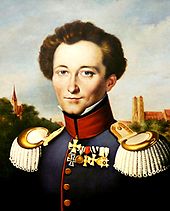
Carl von Clausewitz
The eavesdropper on the wall hears his own shame
What is meant by this is that we sometimes overhear or actively eavesdrop on conversations that are not meant for us, and thereby also learn unpleasant truths or opinions about ourselves. Similarly: The eavesdropper behind the wall hears his own shame. Also: Whoever eavesdrops behind the wall hears his own shame.
See also: The eavesdropper on the wall hears his own shame.
The Last of the Mohicans
The Last of the Mohicans is an 1826 historical novel by the American author James Fenimore Cooper, whose plot is set at the time of the French and Indian War. It is the second novel in the Leatherstocking series about the trapper Natty Bumppo. The novel deals with the demise of North American Indian tribes at the hands of advancing European settlers.
During the so-called French and Indian War between the French and the British and the Indian tribes allied with each of them, there are disputes over the British Fort William Henry. While the Hurons are allied with the French, the Mohicans are on the side of the British. When the fort is captured by the French, a massacre takes place.
The tribal name Mohican is a neologism of Cooper. The name of this fictitious tribe was created by drawing together the names of the two New England tribes Mahican and Mohegan.
As early as the 19th century, the phrase "the last of the Mohicans" became proverbial for many last witnesses or supporters of an idea:
- The last Mohicans of CB radio
- The last Mohicans of church youth work
- The Last Mohicans in the GDR's State Economy
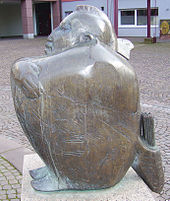
Mohican Chingachgook at the Leather Stocking Fountain in Edenkoben
The pilot disembarks
Even though Otto von Bismarck did everything he could to eliminate potential successors, in the 1880s there was a call for a risk-taking foreign policy. After the short reign of Frederick III, the new Emperor Wilhelm II and Bismarck faced each other with two unequal personalities.
On 15 March 1890, Kaiser Wilhelm finally withdrew his support from the Chancellor because of his course of conflict. Two days later, Bismarck handed Wilhelm his letter of resignation. The public reacted with relief to the resignation. Theodor Fontane wrote:
"It is fortunate that we are rid of him. He was really just habitual excitement (sic!), doing what he wanted, demanding more and more devotion. His greatness was behind him."
The English magazine Punch then published a cartoon by Sir John Tenniel on Bismarck's dismissal entitled Dropping the Pilot, which is usually translated in German as Der Lotse geht von Bord.
"The pilot disembarks" was the headline on the cover of the news magazine Der Spiegel of 20 September 1982, on which the German Chancellor Helmut Schmidt was pictured as the outgoing pilot.
Pilots in navigation assume the function of a ship's master for a limited time and distance on a particular waterway and perform their duties as advisors to the master of a ship.
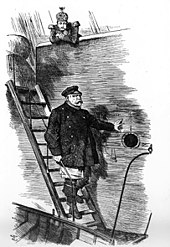
The Punch cartoon Dropping the Pilot
The Man Without Qualities
The novel The Man Without Qualities is the main work of the Austrian writer Robert Musil. Through this novel, Musil also coined the word Kakania (from "k. k." for "imperial-royal") as an ironic term for the Austro-Hungarian monarchy.
The main character of the novel is Ulrich, who fulfils various professional roles, e.g. as a mathematician, engineer or political advisor. However, he experiences all these roles as constrictions and therefore offers up his much-appointed utopian "sense of possibility" in a one-year "holiday from life" to become a better person. He is the symbol of modern man, no longer has an all-encompassing spiritual home and sets himself apart from all other people in his specialised knowledge. He recognises the arbitrariness of world views and yet constantly adheres to new, more absurd theories.
The book title is often used - even in a modified form - in other contexts. For example, an article entitled Man without Qualities: Living and Working in the 21st Century says of white-collar workers and civil servants:
"If one takes business surveys seriously, these men and women without qualities are on the increase. Like the proverbial maggot in the fat, they do their job by the book in companies or authorities. They avoid attracting unpleasant attention through thoughtless statements, opinions or comments. “
Man is born free, and everywhere he lies in chains
The French-Swiss writer and philosopher Jean-Jacques Rousseau wrote in his Social Contract:
"Man is born free, and everywhere he is in bonds. Many a man thinks himself master of his fellows, and yet he is more a slave than they."
There is the short version of this assertion:
" L'homme est né libre, et partout il est dans les fers. »
"Man is born free, and everywhere he lies in chains."
Man is what he eats
Ludwig Feuerbach's review of Jakob Moleschott's Teaching of Food for the People became famous for its casual play on words:
"Man is what he eats."
Man is neither angel nor beast, and misfortune wills that he who wants to make an angel out of him should make a beast out of him.
This pessimistic insight comes from the thoughts of the philosopher Blaise Pascal and reads in the original French:
"L'homme n'est ni ange ni bête, et le malheur veut que qui veut faire l'ange fait la bête. »
According to Pascal's core anthropological thesis, man is a "being of the middle", neither angel nor demon, but half angel and half demon, for there is both possibility in him. Moreover, Pascal states:
"L'homme n'est qu'un roseau, le plus faible de la nature; mais c'est un roseau pensant. »
"Man is but a reed, the weakest of nature; but he is a thinking reed."
The philosopher Karl Popper summarised Pascal's thoughts with regard to Marxism-Leninism on the one hand and National Socialism on the other into the following sentence:
"The attempt to realise heaven on earth always produces hell."
Man does not live by bread alone
is a Bible word ((Deut 8:3 EU, Mt 4:4 EU)). It became the title of a book by Vladimir Dudintsev (more here). This book was published during the thaw period after Khrushchev's secret speech in Moscow in February 1956, with which de-Stalinisation entered a new phase. A translation into German appeared in 1958.
Human needs and motivations are named, among others, in Maslow's hierarchy of needs by the psychologist Abraham Maslow.
The Moor has done his duty
"The Moor has done his duty; / the Moor can go." is a quote from Friedrich Schiller's drama The Conspiracy of Fiesco in Genoa. In the original, however, it does not mean "debt", but "work".
In the drama, the third act reads:
Fiesco. I hear footsteps. It's them. Fellow, you deserve your own gallows where no son of Adam has yet fidgeted. Go into the antechamber till I ring.
Moor (departing). The Moor has done his work, the Moor can go. (Ab.)
Gianettino Doria sees a danger in Fiesco and wants to have him eliminated by the Moor Muley Hassan. However, the Moor betrays the assassination attempt and provides Fiesco with the man with whose help he can carry out his counter-intrigue.
The murderer is always the gardener
The murderer is always the gardener is both the title of a song by Reinhard Mey and a line of its refrain:
The murderer was the gardener again,
and he is already planning the next coup.
The murderer is always the gardener,
and it strikes mercilessly!
The phrase is generally used to refer to stereotypes in patterns of thought and action; in the field of crime literature it is also often used as a self-deprecating reverence to stereotypes of one's own genre. This ironic reverence is often also found in reviews and synopses of works of crime literature.
- "Reinhard Mey sang: 'The murderer is always the gardener'. And whenever parties stumble over unlawful financial transactions, the treasurers are the scapegoats." (Article in the Zürcher Tages-Anzeiger)
- "The murderer is always the gardener! Or the butler? …“ (beginning of the synopsis of a crime novel published by Rowohlt Verlag)
- Der Mörder ist immer der Gärtner - eine kriminale Musikrevue (Title of a play Der Mörder ist immer der Gärtner - eine kriminale Musikrevue by Wolfgang Rumpf & Wolfgang Seppel (Berliner Bühnen Spring 2009))
The next winter is coming for sure
This was the slogan used by Rheinische Braunkohlenbrikett-Verkauf GmbH from 1960 onwards to advertise that its customers were already stocking up on heating material for the winter in the summer, adding slogans like the following:
- "Put briquettes in the cellar now."
- "If you take briquettes in summer, you take care."
Although the slogan is protected by law, it is used by different companies today.
The East is Red
The East is Red (Chinese: 东方红; Dōngfāng Hóng) is a song in praise of the Chinese revolutionary leader Mao Zedong that almost assumed the status of a national anthem during the Cultural Revolution. The lyrics were written by a peasant from Shaanxi province.
| 东方红,太阳升, | Dōngfāng hóng, tàiyáng shēng, |
|
Dong Fang Hong and Dong Fang Hong I are the names of Chinese satellites launched in the 1970s. When it arrives at the moon, the Chang'e-1 probe, launched in 2007, is said to radio the song The East is Red and other patriotic songs back to Earth.
The title of the song is also used in a completely different context in German. For example, an article about voting behaviour in the 2002 federal elections from an East-West perspective is titled as follows:
"Is the East really red?"
Der Osten ist Rot (The East is Red) is also the title of an album by Holger Czukay from 1984. On the record sleeve is printed a news item circulating in 1983 about a book in which the Beijing leadership warns against decadent rock music and instead recommends exemplary songs, such as "Die Fäkaliensammler steigen vom Berg herab" (The faeces collectors descend from the mountain).
Der Osten war rot is a book by Hans-Peter Bärtschi about the failed do-gooder in the former socialist states
The rest is silence
"The rest is silence." are the last words of Hamlet in William Shakespeare's drama of the same name:
O, I die, Horatio!
The strong poison overcomes my spirit;
I cannot hear the paper from England.
Yet I prophesy, the election falls On
Fortinbras: he hath my dying word:
That tells him, along with the fates of chance,Which
brought it there. -The
rest is silence.
(He dies.)
Today, people use this quote to express perplexity or their inability to say anything about a difficult matter.
The rest is silence is also the title of a film by Helmut Käutner from 1959.
The womb is still fertile from which this crawled
This quote with reference to National Socialism comes from the epilogue of Bertolt Brecht's play The Unstoppable Rise of Arturo Ui, which transfers Hitler's seizure and expansion of power to the gangster world. It says:
But you learn how to see instead of stareAnd
act instead of talk, still and still.
Such a thing once almost ruled the world!
The peoples became its master, however, so that
no one would triumph too soon
-The womb is still
fertile, from which this crawled!
The shot heard around the world
The shot heard round the world is a well-known idiom in the USA that refers to the beginning of the American War of Independence. The phrase comes from the first stanza of Ralph Waldo Emerson's Concord Hymn of 1837 and describes the impact of the Battle of Lexington and Concord at the Old North Bridge in Concord, Massachusetts in 1775.
The verse reads:
| By the rude bridge that arched the flood, | By the simple bridge that spans the tideUnfurled |

The verse is engraved at the foot of The Minute Man statue.
The state is me
The guiding principle of absolutism, L'État, c'est moi, is attributed to the French Sun King Louis XIV, who is said to have said this sentence before Parliament on 13 April 1655. Parliament and the King sat together as a court of justice (Lit de justice).
The historian Adolphe Chéruel wrote in his work Histoire de l'Administration monarchique en France, published in 1855:
"Here, according to a suspicious tradition, is the story of the appearance of Louis XIV in Parliament, in a hunting coat, a whip in his hand, and here is the infamous answer to the remark of the first president, who emphasised the interest of the state: 'I am the state'. Instead of this dramatic scene, the most reliable documents show us the King, however, commanding silence from Parliament, but without displaying an insolent arrogance."
Dulaure (Histoire de Paris, 1853, p. 387) admittedly claims:
"He interrupted a judge who used the words 'the king and the state' in a speech, exclaiming with majesty: 'L'État c'est moi'."
Louis consolidated the power of the crown by expanding the administration, by fighting the opposition of the nobility and by promoting the economy. Court culture was entirely tailored to the person of the ruler. His ostentatious appearance became the symbol of his outstanding position.
His last words, however, were: "I die, but the state will always remain". (Je meurs, mais l'État demeurera toujours. )
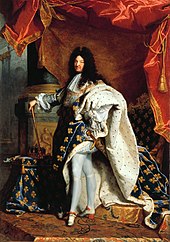
Louis XIV in coronation regalia
The ballot is stronger than the bullet
This was said by the US politician Abraham Lincoln during a speech in Bloomington (Illinois) in 1856:
"The ballot is stronger than the bullet."
The stuff dreams are made of
The Stuff Dreams Are Made Of is a novel by Johannes Mario Simmel, whose title is based on a quote from William Shakespeare's drama The Tempest:
"We are such stuff as dreams are made on, and our little life is rounded with a sleep."
"We are made of such stuff as dreams are, and our little lives are encircled by a sleep."
In this drama, the magician Prospero tells Ferdinand, the bridegroom of his daughter Miranda, in retrospect of his magic play, that the whole earth will dissolve and disappear without a trace.
Simmel's novel depicts a gigantic industrial apparatus in which the fabric for the dreams of millions is woven and the dream world of a man who sacrifices himself for the powerless.
The book title is often used in a different context. For example, it is the title of an article on the sleep hormone melatonin or an article on the methodology of Freudian interpretation of literary works.
The devil is a squirrel
This winged word can be understood ambiguously.
- It denotes an absurd assertion that can be maintained from an illogical conclusion or only with rhetorical gimmicks.
- Because of its red fur and agility, the squirrel is, in superstition, a manifestation of the devil. The saying "The devil is a squirrel" wants to express that evil or misfortune can lurk in the most unsuspicious guises, e.g. that of a squirrel.
See also: the devil is a squirrel (Wiktionary)
Death is a Master from Germany
This line from the Death Fugue by the poet Paul Celan is often quoted, especially in anti-fascist language, and can be found on posters and in murals.
Black milk of the morning we drink you at nightwe drink
you at noon death is a master from Germanywe drink you in the evening and in the morning we drink and drinking
death is a master from Germany his eye is blue
The tourist destroys what he seeks by finding it
This quote by the writer Hans Magnus Enzensberger is mostly used in discussions on the topic of soft or unsoft tourism.
The Austrian folklorist Hans Haid speaks of a "Goa in the Alps" and means by this:
"Around 13 million people live on an area of around 180,000 square kilometres. They are haunted, nourished and stripped bare by 120 million guests with 500 million overnight stays in five million guest beds. The Alpine people are supposed to serve, mow meadows, preserve tanned wooden houses, yodel in traditional costume, sell building plots, wait for guests, serve schnapps, open the Pornostadl, wait at the Jägerzaun (hunter's fence), patiently endure it all.
US humourist Sam Ewing said on the same subject:
"The average tourist wants to go to places where there are no tourists."
"The average tourist wants to go where there are no tourists."
Madness, when it becomes epidemic, is called sanity
At present, this quotation is exclusively attributed to Oskar Panizza, the author of The Council of Love. But Panizza had only taken it over, distorting his source. In the essay Christus in psicho-patologischer Beleuchtung (Christ in psicho-patological light) in the Zürcher Diskuszjonen, he wrote: "As M. Jacobi already rightly said: 'Madness, when it becomes epidemic, is called reason.'"
Panizza's biographer Michael Bauer also concluded from the unprinted notebooks that he was a "psychiatrist Jacobi", without mentioning the first name. What was meant, however, was Maximilian Jacobi. In fact, however, the quotation is in a letter from Friedrich Heinrich Jacobi to Jakob Friedrich Fries dated 29 July 1808: "When madness becomes epidemic, says Hamann in a writing, it applies to sound reason." The philosopher Jacobi had thus excerpted the quotation from a writing by Johann Georg Hamann, also known as "the Magus in the North".
The list of those who gave wings to the quotation among educated people long before Panizza and interpreted it differently is long and includes theologians (J. Scheinert), jurists (Jodocus Temme), physicists (Karl Friedrich Zöllner) as well as doctors and psychologists such as Theodor Puschmann or Rudolf Leubuscher. They all correctly attributed the quotation to Friedrich Heinrich Jacobi. Only the Berliner Gerichtszeitung of 4 May 1867 wrote, "there are times - says a German psychologist, Jacobi, - when madness becomes epidemic." Overall, in addition to the familiar citation, the variant: "Madness, when it becomes epidemic, gets the name of reason." is also frequently found.
The real Jacob
"This is the real McCoy" is supposed to mean, this is the right man or the right, long-sought means. The expression is also used in the form "This is not the real McCoy either" and then means as much as "This is not exactly the right thing either".
The expression is attributed to the apostle James the Elder, whose grave is said to be in the Spanish pilgrimage site of Santiago de Compostela, but whose bones were often assumed to be in other graves.
Other attempts at explanation trace the expression back to the biblical progenitor Jacob, who cheated his brother Esau out of the birthright and his father's blessing.
Der Wahre Jacob was a German satirical magazine founded in 1879 and published intermittently until 1933.
The physicist Albert Einstein wrote in a letter to Max Born about quantum mechanics:
"Quantum mechanics is very respectful. But an inner voice tells me that this is not yet the real McCoy. The theory delivers a lot, but it hardly brings us closer to the secret of the old man. In any case, I'm convinced that the old man doesn't play dice."
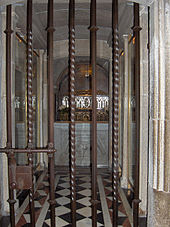
Reliquary in Santiago de Compostela
The road to hell is paved with good intentions
This proverbial saying is attributed to the English lexicographer Samuel Johnson and handed down by his biographer James Boswell:
"Hell is paved with good intentions."
"Hell is paved with good intentions."
In a similar form, the saying can also be found in the Scottish poet Walter Scott, who traces it back to an English theologian of the 17th century. Chesterton explicitly disagreed: "Only Calvinists can believe that hell is paved with good intentions. That is precisely what it cannot be paved with."
US humourist Sam Ewing slightly modifies the saying by saying on the subject of the internet:
"The information highway is paved with good inventions."
"The information superhighway is paved with good inventions."
The last word in wisdom
At the end of his life, the blind Faust in Goethe's drama Faust II has a vision of a paradisiacal land that has been wrested from the sea and must be constantly defended against the tide. He comes to the following realisation:
Out there the tide rushes up to the edge,
And as it nibbles, violently shoots in,
Common urge hastens to close the gap.
Yes! I am completely devoted to this sense,
That is the last word in wisdom:
Only he earns freedom like life,
Who must
conquer it daily.
Today, the words "not the last word in wisdom" mean that something is not the perfect solution. For example, an article in the daily newspaper Die Welt about Spinner GmbH is headed with the words "Cutting jobs is not the last word in wisdom".
The wind told me a song
These words come from a song by the pop poet Bruno Balz, whose refrain begins as follows:
The wind has told me a song Of a happiness unspeakably beautiful;
He knows what my heart is missing,
For whom it beats and glows.
In the 1937 film La Habanera, Zarah Leander sings this hit song that expresses the longing for a distant, past happiness. The film tells the story of a Swedish woman who has married a rich Puerto Rican but cannot find happiness on Puerto Rico. She patiently bears her suffering for ten years until a childhood friend suddenly appears and her fate turns around again.
The song subsequently became one of the Swedish Ufa star's most successful songs.
Enough words have been spoken, let me finally see deeds
This exhortation comes from the prelude at the theatre to Goethe's drama Faust I. In a conversation between the director, the theatre poet and the funny person, the director is of the opinion that what matters most in theatre is audience appeal. He does not accept the poet's objections and finally ends the dispute with these words.
The die is cast
The expression "crossing the Rubicon" is the term for a momentous decision, such as Caesar's crossing the Rubicon, because it unleashed civil war. When Caesar, after wavering for some time, decided to cross the Rubicon, he is said to have said alea iacta est.
On 10 January 49 BC Julius Caesar marched on the Rubicon, the border river to the demilitarised zone around Rome, which no Roman commander was allowed to approach with his troops, and first said:
"We can still go back; if we cross this little bridge, everything will have to be fought out with weapons."
While he was still standing there, a shepherd came, snatched the trumpet from a soldier, crossed the river and blew the alarm. Caesar then said:
"Thither leads the way where the signs of the gods and the outrages of the enemies call. Thrown is the die."
According to Athenaeus of Naucratis, this sentence originally came from Menander. In the Life of Pompey, Plutarch reports that the phrase was uttered in Greek:
"Ἑλληνιστὶ πρὸς τοὺς παρόντας ἐκβοήσας, Ἀνερρίφθω κύβος, διεβίβαζε τὸν στρατόν."
"He spoke in a loud voice in Greek to those present 'Up cast the die' and led the army across."
Suetonius gives a not quite literal translation Iacta alea est! Most often quoted Alea iacta est! ("The die is cast!") or Aleae iactae sunt! ("The die is cast!").
Location of the Rubicon River in Northern Italy
The one who
This colloquial expression has the meaning of "the one being talked about". It comes from the short Berlin local farce Das Fest der Handwerker by Louis Angely. In the play itself, however, it means "always the one who".
The Emperor's New Clothes
The Emperor's New Clothes (Danish: Kejserens Nye Klæder) is a fairy tale by the Danish writer Hans Christian Andersen. It tells the story of a vain emperor who is deceived by two cunning swindlers. They promise to make him the most beautiful clothes, which will be invisible to anyone who is not fit for his office:
"The chamberlains, who had the right to wear the train, grasped their hands against the floor as if they were lifting the train, they walked and acted as if they were holding something in the air; they dared not let it be known that they could see nothing.
So the emperor walked under the splendid canopy of the throne, and all the people in the street and in the windows said: 'How incomparable are the emperor's new clothes! What a train he has on his dress! How beautifully it fits!' No one wanted to let it be known that he saw nothing, for then he would not have been fit for his office or would have been very stupid. No dresses of the emperor had made such happiness as these."
The hoax is only discovered when a child exclaims that the emperor has no clothes at all:
"The father said, 'Hear the voice of innocence,' and the one hissed to the other what the child had said.
But he's not wearing anything!' cried the whole crowd at last."
The singer Reinhard Mey sings about this theme in his song Des Kaisers neue Kleider, in which he questions the modern art business:
As far as I'm concerned, I'm fed up.
Can't anyone here see that the emperor has no clothes on?
That's neither new nor original, it's just stupid. Take a
good look, the poor guy is stark naked.
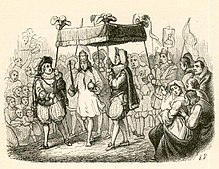
The Emperor's New Clothes
The toil of life
In the play Torquato Tasso by Johann Wolfgang von Goethe, the Secretary of State Antonio Montecatino says in the fifth act:
"Life's toil alone teaches us to appreciate life's goods."
Despotism tempered by sloppiness
"The Austrian government is equally incapable of being consistent in a work of justice as in a work of oppression; it constantly sways to and fro, - we have mitigated despotism by sloppiness."
With these words of his report "on the situation of the socialist movement in Austria", Victor Adler, co-founder of the Social Democratic Workers' Party, provoked "great hilarity" at the International Workers' Congress in Paris in 1889.
There are similar statements about other states:
The French writer Nicolas Chamfort, in his Caractères et Anecdotes, gives a witty man as the inventor of the following quotation:
" ... le gouvernement de France était une monarchie absolue, tempérée par des chansons. »
"France is an absolute monarchy tempered by lively songs."
(other translation: "... absolute monarchy tempered by joke words.")
After the assassination of the Russian Tsar Paul in 1801, a Russian prince said to the Hanoverian envoy Count Münster:
" Le despotisme, tempéré par l'assassinat, c'est notre Magna charta. »
"Tyranny tempered by assassination, that is our Magna Charta."
Deus ex machina
The Latin phrase Deus ex machina ("God from the machine") is a loan translation from the Greek ἀπὸ μηχανῆς Θεός ("apo mechanes theos") and originally denotes the appearance of a deity with the help of stage machinery.
In ancient tragedy, there were conflicts that could not always be resolved from within the plot. They were resolved from the outside through the surprising intervention of a deity who gave the events the decisive turn. The deus ex machina hovered above the stage in a hoisting machine or landed on the roof of the stage house. Swivel cranes were used, with the help of which the intervening deity could be hoisted onto the stage from outside.
A famous example can be found in the drama Iphigenia at the Taurians by the poet Euripides. There, the goddess Artemis appears over the temple at the last moment to save Iphigenia and Orestes from the wrath of the Taurian king Thoas and passes a just sentence to which everyone submits.
Being German means doing a thing for its own sake
The expression, which is usually used derisively, refers to actions that are not questioned and can be traced back to a statement by Richard Wagner that was meant differently. In his essay Deutsche Kunst und deutsche Politik, published in 1867, Wagner wrote:
"Here it came to consciousness and received its definite expression, which is German, namely: to do the thing one is doing for its own sake and for the sake of the joy of it.
German workers, the SPD wants to take away your villas in Ticino!
The graphic designer Klaus Staeck published an ironic political poster for the 1972 Bundestag elections showing a modernist villa in toxic yellow under a blue sky with the Fraktur typeface:
"German workers! The SPD wants to take away your villas in Ticino!"
The poster, the irony of which did not meet with the SPD's undivided approval, now hangs in the Haus der Geschichte in Bonn. As a postcard and sticker, it reached a circulation of 70,000 copies.
Willi Winkler wrote in 2008 on Klaus Staeck's 70th birthday in the Süddeutsche Zeitung:
"The saying 'German workers! The SPD wants to take away your villas in Ticino' has become proverbial, even if it soon lost its impact when the million-dollar fraud of the gentlemen from the trade union holding Neue Heimat became obvious."

Klaus Staeck
German Michel
The German Michel, the national personification of the Germans, probably goes back to the Archangel Michael (as patron saint of the Holy Roman Empire and later of Germany) or a certain Hans Michael Elias von Obentraut. The earliest documented tradition is found in a book of proverbs published by Sebastian Franck in 1541 - i.e. a few decades before Obentraut's birth. Here, the German Michel refers to a dolt and a fantasist.
Germany, united fatherland
"Germany, united fatherland" is a verse from Johannes R. Becher's Risen from Ruins, the national anthem of the German Democratic Republic:
Risen from the ruinsAnd
turned towards the future,
Let us serve thee well,
Germany, united fatherland.
After the GDR backed away from German reunification, the text became uncomfortable. In 1972, for example, Willy Brandt responded to Willi Stoph's statement that there were two German states by referring to the first verse:
"You yourself sing about Germany, united fatherland, in your anthem."
With the transfer of power to Erich Honecker, the lyrics then disappeared from public view in the early 1970s, and the anthem was only performed instrumentally.
The word became more prominent in the public consciousness at the time of the fall of communism towards the end of 1989, partly replacing the word "We are the people".
Germany must live, and if we must die
This slogan comes from the poem Soldatenabschied by Heinrich Lersch:
Let me go, Mother, let me go!
All the crying can't help us any more,
because we are going to protect the fatherland!
Let me go, Mother, let me go!
I will kiss your last greeting from your mouth:
Germany must live, even if we have to die!
This sentence can be found on numerous war memorials, for example at the Dammtor in Hamburg, but also as the motto of the military cemetery in Langemarck. The monument was regularly the target of paint bombs, graffiti and other actions.
In circles of the anti-Germans as well as parts of the Antifa, this slogan is turned around into "Germany must die so that we can live", Thus there is a song by the punk band Slime (band) with corresponding lyrics.
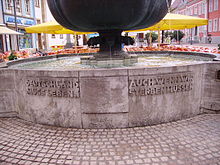
Inscription on a fountain in the pedestrian zone of Speyer
Germany above all!
The often misunderstood beginning of the Deutschlandlied "Germany, Germany above all, above all in the world" was not a call to subjugate non-German territories for August Heinrich Hoffmann von Fallersleben.
Kurt Tucholsky said about this:
"'Germany above all', a foolish verse of a loudmouthed poem. No, Germany is not above everything and is not above everything - never. But with all it shall be, our country."
The Scientific Service of the German Bundestag comments on the same topic as follows:
"With this - later often tendentiously misunderstood - beginning of the song, the author wanted to express emotionally that he wanted a unification of the individual German states and thus the unity of Germany 'above all else in the world'. Not geographical expansion, but an all-German constitution was his political concern."
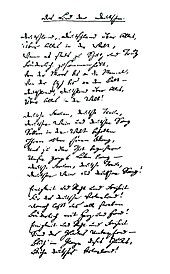
Facsimile of the original of the Deutschlandlied
Germany's future lies on the water
This vision comes from a speech by the German Emperor Wilhelm II on the occasion of the inauguration of the Stettin Freeport in September 1898. With these words, Wilhelm expressed his conviction that Germany could only improve its position in world politics if, in addition to an expanded merchant navy, it also had a strong navy at its disposal for conquering and securing colonies.
Poetic freedom
To be a little more generous with historical facts in a work of fiction is poetic licence. The first time this term appears is in a work of natural science by the Roman scholar Lucius Annaeus Seneca, who writes in the chapter on lightning:
"It belongs to poetic liberty (poeticam istud licentia decet) to assert that Jupiter changes the power of his thunderbolts according to what he wants to strike with them."
Fiction and truth
Dichtung und Wahrheit (Poetry and Truth) is the abbreviated title of Goethe's autobiographical memoirs from the years 1749 to 1775. Goethe himself occasionally used the version "Wahrheit und Dichtung" (Truth and Poetry), but probably preferred the first version for tonal reasons. The full title is Aus meinem Leben. Poetry and Truth.
Today, we use this expression when we have doubts about whether an account really corresponds to the facts and suspect that the facts are invented.
Only the wind knows the answer
Die Antwort kennt nur der Wind (Only the Wind Knows the Answer) is the title of a novel by Johannes Mario Simmel, which was filmed in 1974 and which in turn takes up the refrain of the song Blowin' in the Wind by Bob Dylan. The pacifist song has three verses. Questions are asked that are answered each time with the same last line of lyrics:
"The answer is blowin' in the wind."
"The answer drifts in the wind."
In the German translation of the song lyrics:
"The wind alone knows the answer."
The song was considered an anthem of the folk rock movement. This quote is often used to refer to leaving a question unanswered.
Poverty comes from the Powerteh
This saying goes back to a quotation from Fritz Reuter's work Ut mine Stromtid, where Inspector Bräsig concludes his speech at the Rahmstadt Reformverein with the following words:
"The great poverty in the city comes from the great powerteh."
The word "powerteh" is a verbalised form of the French word pauvreté, which means poverty.
The eyes of the world are upon you
In his order to land in Normandy on 6 June 1944, General Dwight D. Eisenhower said to his soldiers in English:
"The eyes of the world are upon you."
Eisenhower said in his address, among other things:
Soldiers, sailors, airmen,
you are about to embark on the Great Crusade for which we have been striving for so many months. The eyes of the world are upon you. The hopes and prayers of freedom-loving peoples everywhere march with you. Together with our brave allies and brothers in arms on other fronts, you will bring the destruction of the German war machine, the removal of Nazi tyranny over Europe's peoples and security for ourselves in a free world.
Similar formulations existed even before 1945. For example, the satirist Kurt Tucholsky wrote in 1931 under the headline Die Augen der Welt:
As far as foreign policy is concerned, Germany is dominated by domestic politics. One of its iron principles is the phrase: 'The eyes of the world are on us'. This phrase is simply a lie.
Germany does not play the role in the world that it thinks it does.
Today, the quotation is mainly used in variations:
- "The eyes of the world fixed on Vienna." (Summit 1961 Khrushchev - Kennedy)
- "The eyes of the fashion world are once again on Paris."

Into the Jaws of Death: US Army troops land on Omaha Beach on D-Day
The axe in the house saves the carpenter
This quote - often used in reference to do-it-yourselfers - comes from Friedrich Schiller's drama Wilhelm Tell. It describes how Tell repairs the farm gate with an axe, his wife devotes herself to domestic chores and their son plays with bow and arrow. The conversation revolves around the boy, for the mother has something against shooting, while Tell praises the early practice. (see "Early practice makes perfect.") Then Tell's wife says what fear she endures when he goes into the mountains. At the end of the conversation, Tell, satisfied, examines his work and speaks the above words.
In the SüddeutscheZeitung it says under the headline You can build on these phrases about this famous quote:
"A sentence from a piece, seamlessly dense and yet freely accessible to every association. A bit of self-praise resonates, but ironically amusingly broken. The spare carpenter is by no means the quintessence, but rather the pleasure of doing it yourself."
The basis of a healthy order is a large wastepaper bin
With these words Kurt Tucholsky wants to suggest that it serves order if one gets rid of superfluous things. He writes this in a newspaper article with the meaningful title Das kann man noch gebrauchen -!
With a side swipe at the throwaway society in the United States, Tucholsky writes in the article:
"The American throws everything away: tradition, old cars, his birthplace, hoovers and old boots. Why? - Because the new ones don't cost as much; because no one and no company there is equipped for lengthy repairs - because no one understands that you preserve an object for its own sake when there is already another one around the corner.
The situation is different in Europe:
"The European, however, is of a clingy disposition and keeps everything for himself. For example, in politics..."
Tucholsky understands the inhibition to throw away goods, but writes:
"It's an atavistic respect for the thing, stemming from the time when an object was still made by hand ... Today the machines spit it out - throw it away! throw it away!"

Messy flat
The best of all possible worlds
The postulate that we live in the best of all possible worlds is part of the larger philosophical argument of the 17th century, according to which God could not have produced anything less than precisely the best of all possible worlds with the cosmos. He would not otherwise have been God, the perfect being.
From Voltaire's satirical novel Candide or Optimism comes the sentence:
" Tout est pour le mieux dans le meilleur des mondes possibles. »
"Everything is in the best of order in the best of possible worlds."
Voltaire has his protagonist Candide undertake a voyage around the world with Pangloss, the distorted image of a philosopher. Pangloss sticks to his opinion despite shipwreck, earthquake, inquisition, illness and execution:
"This is the best of all possible worlds."
Candide retorts:
"If this is the best of all possible worlds, I want to see the rest of them first!"
The German philosopher Gottfried Wilhelm Leibniz's Theodicy states:
"... nisi inter omnes possibiles mundos optimus esset, Deus nullum produxisset."
"God would not have created a world if it were not the best among all possible ones."
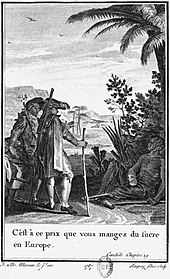
Candide meets a mutilated slave
The best wife of all
The Israeli satirist Ephraim Kishon used this topos (also: "the best of wives") to describe his second wife Sara Kishon (née Lipovitz). She is the mother of his son Amir and daughter Renana. Sara Kishon herself wrote a satirical response to her husband's stories in 1996 entitled "My Beloved Liar. The Confessions of the Best Wife of All". In this book, she tells some of the stories already known from her husband's point of view, from her point of view.
The expression has entered the German vocabulary and is frequently used, such as:
- "The little book for the best of wives".
- "What does the best of wives have to say about that?"
The bombing of Russia begins in five minutes
With a microphone test on 11 August 1984, US President Ronald Reagan triggered a serious diplomatic crisis by saying shortly before a radio broadcast:
"My fellow Americans, I'm pleased to tell you today that I've signed legislation that will outlaw Russia forever. We begin bombing in five minutes."
"Fellow Americans, I am pleased to announce today that I have signed a law declaring Russia forever outlawed. The bombing of Russia will begin in five minutes."
The media published this audio sample, which led to fierce criticism worldwide.
The White Man's Burden
Poem by Rudyard Kipling: The White Man's Burden
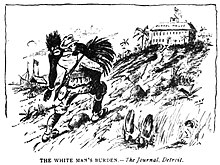
Caricature around 1823
The earth has me again
This quotation comes from Johann Wolfgang von Goethe's drama Faust I, where the desperate Faust is about to reach for the vial of poison. But he is prevented from doing so by the chorus of angels who announce Easter morning ("Christ is risen") and exclaim:
O sound away, you sweet songs of heaven!
The tear wells up, the earth has me again!
The quote is used when one has just left a plane with relief or stepped ashore from a ship.
The earth be light unto thee!
This saying occurs as a grave saying in different variations:
"Light be unto thee the earth!"
"May the earth be light to you!"
In the Latin form, the saying goes:
"Sit terra tibi levis."
These words have been read on tombstones since ancient times. They go back to a passage in the Second Book of Elegies by the Roman poet Tibull and refer to a girl who died young. It says in Tibull:
"Terraque securae sit super ossa levis."
"And let the earth be light upon the bones of those who are borne."
Memory is the only paradise from which we cannot be driven
This quotation comes from the Impromptus, which I will write in future in Stammbücher, by the writer Jean Paul, published in 1812. (Usually wrongly attributed to the novel The Invisible Lodge.) This insight was certainly not new at the time, but was brought to the point by Jean Paul:
"Memory is the only paradise from which (often quoted: from which) we cannot be driven (usually quoted: expelled). Even the first parents could not be driven out of it."
By the "first parents", Jean Paul means the progenitors Adam and Eve, who were expelled from paradise but managed to retain the memory of it.
The writer Arthur Schnitzler comments on this quotation as follows:
"Memory, says Jean Paul, is the only paradise from which we cannot be driven. Sometimes that may be true. More often, however, memory is the only hell to which we are guiltlessly condemned."
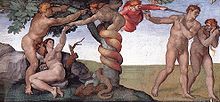
Michelangelo: Fall of Man and Expulsion from Paradise
The first will be last and the last will be first
This comforting reference comes from the Gospel of Matthew, where Jesus explains to his disciples during a discussion about who enters the kingdom of God and how:
"27 Then Peter answered and said unto him, Behold, we have left all, and followed thee: what shall we have for it? 28 And Jesus said to them: Verily I say unto you: Ye which have followed me, in the regeneration, when the Son of man shall sit in the throne of his glory, ye also shall sit upon twelve stools, judging the twelve tribes of Israel. 29 And whosoever shall leave house, or brethren, or sisters, or father, or mother, or wife, or children, or lands, for my name's sake, the same shall receive an hundredfold, and shall inherit life eternal. 30 But many that are first shall be last, and the last shall be first."
The owl of Minerva only begins its flight as dusk falls
The owl of Minerva is to be understood as a metaphor for philosophy or wisdom. However, the ancient Italian deity Minerva was equated with Athena, the Greek goddess of wisdom, whose best-known attributes include the owl.
See also: Γλαῦκ᾿ εἰς Ἀθήνας. (Carrying owls to Athens)
The quotation expresses that knowledge is only possible from a certain distance in time. It comes from Georg Wilhelm Friedrich Hegel's preface to his Grundlinien der Philosophie des Rechts, published in 1821. There it says:
"When philosophy paints its grey in grey, then a figure of life has grown old, and with grey in grey it cannot be rejuvenated, but only recognised; the owl of Minerva only begins its flight with the breaking of dawn."
Hegel compared philosophy to the owl that only flies out at dusk. He is of the opinion that philosophy, too, only comes into its own when the evening of events (= history) has come. Philosophy therefore only has the possibility to analyse processes when they have passed and always comes too late with its teachings.
Often alluding to the fact that philosophers, writers and other scholars of the humanities tend to prefer the evening and night hours for reflection and debate.
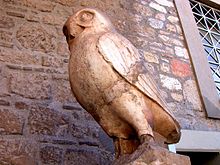
Owl on the Acropolis in Athens
Raise the flag!
These words are the beginning of the National Socialist Horst Wessel Song, a battle song of the SA that became the party anthem of the NSDAP. It is named after the SA man Horst Wessel, who wrote the lyrics between 1927 and 1929 to a melody that probably originated in the 19th century. It was printed as a poem in August 1929 by the SA organ Der Angriff with the title Die Fahne hoch! and begins with the following stanza:
The flag high!
The ranks tightly (firmly) closed!
SA marchesWith
calm firm step|
: Kam'raden, die RotfrontUnd
Reaktion erschossen,
Marschier'n im GeistIn unser
'n Reihen mit:|
After Hitler came to power in 1933, the song functioned as a second national anthem, modelled on the Italian Giovinezza. The Allied Control Council banned the song in 1945 after Germany's defeat in the Second World War. On 1 August 1968 (one year before the criminal law form), a § 86a StGB ("Use of symbols of unconstitutional organisations") was added to the German Criminal Code. In Austria, comparable provisions apply (§ 3 of the Prohibition Act 1947).
When the Nazi regime issued the slogan "guns instead of butter" (armaments instead of consumer goods), joke tellers invented "Horst Wessel butter" ("march along in spirit on our bread").
Bertolt Brecht parodied this Nazi song in his drama Schweyk during the Second World War with his Kälbermarsch:
"The butcher calls. Eyes tightly closedThe
calf marches with calm firm tread. The
calves whose blood has already flowed in the slaughterhouseThey
move along in spirit in his ranks."
It should also be mentioned here that the SA also had a storm song with the ambiguous title Wir sind des Führers braune Haufen. Horst Wessel himself wrote in a letter to the Hitler Youth:
"We are Hitler's brown bunch, and with first place we want to carry our swastika banner to the storm."
The woman is silent in the congregation
In Greek, verse 14:33b-35 of Paul's 1st letter to the Corinthians reads:
"Αἱ γυναῖκες ἐν ταῖς ἐκκλησίαις σιγάτωσαν."
"Hai gynaikes en tais ekklesiais sigatosan."
This commandment of silence for women is unique in the writings of the Apostle Paul. In biblical theology and textual research, it is disputed whether the sentence is by Paul or a later insertion.
The saying is modelled on a gnome by the Greek poet Menander, in which it says:
"Looms and not community meetings are women's work."
The Latin version is better known: Mulier taceat in ecclesia.
Goethe writes in the 7th book of his Tame Xenia:
What wonderful times those were! In ecclesia mulier taceat!
Now that one has every voice, What will Ecclesia mean.
All the world's a theatre
On the Globe Theatre in London, which holds a place in theatre history mainly through performances of William Shakespeare's works, Shakespeare had a Latin saying affixed:
"Totus mundus agit histrionem."
From Shakespeare's play As You Like It (2.7.138-9) comes the English version:
All the world's a stage,
And all the men and women merely players.
All the world's a stage,
And all the men and women are just players.
The Irish playwright Oscar Wilde made of it:
The world is a stage, but the play is badly cast.
The world is a stage, but the play is badly cast.
_-_156.JPG)
Replica of the Globe Theatre
The Guard Dies and Does Not Surrender
The French General Pierre Cambronne is reported to have said at the Battle of Waterloo:
"La garde meurt et ne se rend pas. »
"The old guard dies and does not surrender."
In this context, the following slogan is occasionally quoted:
"Let's die here and save the Emperor in the process!"
But the fact is that he surrendered himself and firmly denied this saying. Nevertheless, the statue in his native city of Nantes was inscribed with the saying.
The saying probably originated with the journalist Balisson de Rougemont, who had it printed in the magazine "L'Indépendant" in 1815. In addition, General Michel's sons protested against the inscription on Cambronne's statue and claimed copyright for their father.
The Napoleonic Imperial Guard (French: Garde impériale) was the elite corps of the Grande Armée founded in 1804. It was considered almost invincible until Waterloo. Napoleon often used the Guard as a last reserve in his battles and preferred to deploy it in battle-decisive situations.
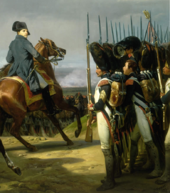
Romanticising depiction of the Imperial Guard
The Secret Seducers
The Secret Seducers is a non-fiction book on advertising published by the US consumer critic Vance Packard in 1957 under the original English title "The Hidden Persuaders". The subtitle "The Grip on the Subconscious in Everyone" refers to the so-called motive research. Packard criticises the persuasion to make purchasing decisions that have nothing to do with actual needs and also nothing to do with the quality of the product.
The curved road is the way of the donkeys
This sentence comes from the Swiss architect Le Corbusier, who claimed in 1925:
"La rue courbe est le chemin des ânes, la rue droite le chemin des Hommes."
"The curved road is the way of the donkey, the straight road is the way of man."
Le Corbusier was concerned with the car-friendly city. Manfred Sack wrote about this quote in the weekly newspaper Die Zeit in 1988:
"He meant the city of the mass automobile. His radical proposal was not followed anywhere because people clung to the old city, to the varied, surprising, confusing city, the city that was confused with the shapely, unmistakable city that they loved, that they had also learned to experience as an architectural and as a refined spatial event.""
Seizing the opportunity
This expression goes back to the Greek myth of the god Kairos (καιρός = favourable opportunity), who was depicted flying away with a curly head and a bald neck, because one seeks to seize the good opportunity only when it has disappeared. The god of the favourable moment is depicted in art with a bald back of the head and a shock of hair on the forehead, by which the favourable moment could be well grasped.
In Greek it means:
"Γίγνωσκε καιρόν. »
"Gignōske kairon."
"Know the right time!"
The saying is attributed to Pittakos of Mytilene, the commander of the Mytilene army in the battle against the Athenians. He agreed with the leader of the Athenians, Phrynon (Olympic champion in pankration), to fight only among the leaders. In hand-to-hand combat he threw a net over Phrynon and defeated or killed him; thus the battle against Athens was won without further bloodshed.
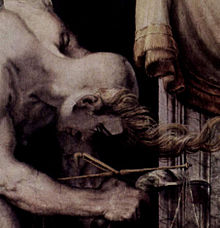
Francesco Salviati: Hair of the Kairos
The straight line is godless
This dictum comes from the so-called Verschimmelungsmanifest (Moulding Manifesto) initiated by the Austrian artist Friedensreich Hundertwasser in a speech at Seckau Abbey on 4 July 1958:
"The straight line is godless and immoral. The straight line is not a creative but a reproductive line. In it dwells not so much God and the human spirit as the comfort-loving, brainless mass ant."
Hundertwasser sees the ruler as a symbol of the new illiteracy. He believes that in earlier times the straight line was a privilege. Today, however, "every moron owns millions of straight lines".
The Swiss architect Le Corbusier was of a different opinion, claiming:
"The curved road is the way of the donkey, the straight road is the way of man."
.jpg)
Exterior wall of the Hundertwasser day-care centre in Frankfurt am Main-Heddernheim
The heroes are tired
Die Helden sind müde is the German title of a French feature film from 1954 (French: Les héros sont fatigués). The title is usually quoted derisively when people slacken in their zeal in accomplishing a task.
Hell, these are the others
In Jean-Paul Sartre's play At Closed Doors (also: Closed Company; French: Huis clos), three people who have just died find themselves in a salon that is identical to hell.
The three cannot leave the room and are thus dependent on each other. They have to realise that their personal freedom finds its limit in the demands of the other. But they cannot even kill each other, because they are already dead. The man among the three then comes to the realisation:
"Pas besoin de gril: L'enfer, c'est les Autres. »
"There's no need for a grill, hell, it's the others."
The dogs bark, but the caravan moves on
The translation of the Turkish proverb "it ürür kervan yürür" was a saying often used by the then German Chancellor Helmut Kohl. His characteristic of sitting out problems and not responding to his counterpart, which was attributed to him, was also called the "Helmut Kohl syndrome". This strategy of acting as if one does not need to react to criticism and waiting until the opponent gives up can only be afforded by those who are in a clearly stronger position.
Those I called, the spirits
Towards the end of Goethe's ballad The Sorcerer's Apprentice, the careless sorcerer's apprentice realises that the spirits he has conjured can no longer be brought under control and, unable to think of the right incantation, he moans in despair in the penultimate stanza:
Ah here comes the Master!
Lord, the need is great! The
spirits I called,
I cannot get rid of now.
The quote is used today when a development gets out of control. This is what it says in a speech by Green MP Stefan Wenzel on the subject of setting up a parliamentary committee of enquiry into the Asse mine:
"Nuclear power is a bit like the broom in Goethe's 'Sorcerer's Apprentice'. It is a servile spirit until at some point the flowing floods that it drags in by the bucketful can no longer be stopped:
And then come the cries of terror:
'Oh you spawn of hell, shall the whole house drown?
' 'Those I called, I cannot now get rid of the spirits!'Do you
know what the difference is between Goethe's sorcerer's apprentice and you, Mr. Minister of the Environment? The sorcerer's apprentice had only forgotten the word to stop the madness. There is no magic word for their nuclear power. And if there is one, then it is: Nuclear power - no thanks!"
The Ghosts I Called... is the German title of the US-American film comedy Scrooged (actually: "Der Geizhals").
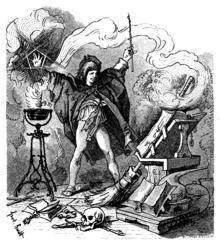
The Sorcerer's Apprentice
You can't see the ones in the dark
The most popular song from Bertolt Brecht's play The Threepenny Opera is The Moritat of Mackie Messer. Especially the last verse of the film version picks up the theme of social injustice:
For some are in darkness, and
others are in light.
And one sees those in the light.
Those in the dark are not seen.
"... you can't see those in the dark!" was the title of a conference on poverty and health risks among children held at the Hanover Medical School in July 1998.
Die im Dunkeln sieht man nicht is the title of a novel by Johannes Mario Simmel and the headline of an article about those behind a corruption scandal in Manager Magazin.
The whole direction doesn't suit us!
"The whole direction doesn't suit us!" was the answer of the Berlin police president Freiherr Bernhard von Richthofen in 1890 to the question of the theatre director Oscar Blumenthal as to why the drama "Sodom's End" by Hermann Sudermann was banned. In the play, the urban clique of the nouveau riche became the subject of a biblical story. It is a forerunner of the naturalist movement in Germany.
The Sixteenth Chapter of Memoirs of a Socialist - Apprentice Years, an autobiographical novel by Lily Braun from 1909, says of the play:
"So we saw "The Glory" and "Sodom's End", whose original ban was attributed to the Emperor's direct intervention and had ensured the work's success from the start. The deep impression we received was composed of amazement, horror and emotion. But while it was released in my mother by the liberating thought that here the corrupt bourgeoisie and the hated parvenus were being held up to a ghastly reflection that was basically none of their business, it had a painful effect on me."
The Emperorless, the Terrible Time
This is a phrase from Friedrich Schiller's ballad Der Graf von Habsburg. There it says about the coronation of Rudolf of Habsburg, who ended the interregnum:
Loudly the sound of the trumpets was mixed with the
cheering shout of the crowd;
For after a long and
ruinous
conflict the
time without an emperor, the terrible time, had
ended,
and a judge was once again on earth.
No longer blindly wields the iron spear,
No longer fears the weak, the peaceful,To
become the prey of the mighty.
This politically motivated ballad by Schiller dates from 1803 at the time of the Napoleonic Wars in view of the fall of the Holy Roman Empire. When Schiller characterises the Interregnum as a terrible time, this concept stems from a 19th-century view of history that glorified the Staufer rule and saw the Interregnum as an age of turmoil. It is historically incorrect that Schiller refers to Rudolf of Habsburg as emperor in his ballad, as at the beginning of the third stanza: Und der Kaiser ergrifift den goldnen Pokal Rudolf of Habsburg was never crowned emperor by the Pope, but remained Roman-German king after the election of the king until his death.
M. Barack published a rhymed list of the German emperors and rulers from Charlemagne to Wilhelm II in 1885 with a supplement in 1888 under the title: Die Deutschen Kaiser (The German Emperors), in which he took up Schiller's quotation from Rudolf von Habsburg:
After a long, pernicious dispute, the time
without an emperor, the terrible time, came to an end.
The culture of a people is based on the consumption of soap
This phrase, meant quite seriously, was widespread in the second half of the 19th century. It is a variation of an idea formulated by the German chemist Justus von Liebig in his "Chemical Letters" published in 1844:
"The soap is a measure of the prosperity and culture of the states."
Art goes to bread
In Gotthold Ephraim Lessing's tragedy Emilia Galotti, these words are the painter Conti's answer to Prince Hettore's question about what art is all about. Lessing thus uses a proverb that is already attested to in the 16th century. The quote is used today to suggest that art and commerce are inseparable.
The director Hellmuth Matiasek said in 2004 in his laudation for 30 years of Paul-Klinger-Künstlersozialwerk:
"Of all people, he puts this into the mouth of a painter employed by the court. Could Lessing have guessed that exactly 200 years later another creative lateral thinker would take up this taboo and proclaim: 'We artists do not want to be the peons of the cultural gift!'"
The situation has never been so serious
Rudolf Augstein said in an interview about the Spiegel affair and its consequences about the then already 86-year-old Chancellor Konrad Adenauer:
"For all the caution and cunning that kept the old man in office for 14 years, Adenauer was also rigid and, incidentally, a master of superlatives and catchy phrases. With the slogan "No experiments" he had won an absolute majority in the 1957 Bundestag election. How often he said "The situation has never been so serious" could not be counted."
Adenauer's saying also recurs in several book titles:
- Erhard Kortmann and Fritz Wolf: The situation has never been so serious. Konrad Adenauer's winged words
- Karl Hoche: The situation has never been so serious. A history of the Federal Republic in its satire
The Last Days of Mankind
The Last Days of Mankind is the title of Karl Kraus' tragedy about the horrors of the First World War, depicted in 220 documentary scenes with 500 characters.
The title is used today as a quotation in connection with visions of the end of the world.
Reading the riot act
Around 760, Bishop Chrodegang of Metz established a rule of life for the improvement of the feral clergy, which obliged the clergy to assemble before the bishop or his deputy after morning worship; the bishop read them a chapter of the Bible, especially from the 3rd Book of Moses, Leviticus, which contains religious laws for priests and Levites, and often attached exhortations to it.
A number of special laws and regulations apply to the Levites, who still exist today as a separate group in religious Judaism. Among other things, the Levites were responsible for keeping the rules in the 3rd Book of Moses.
- The 26th chapter of the 3rd book of Moses
The love of gypsies comes from
This cliché comes from the song with which the main character introduces himself in the opera Carmen.
L'amour est enfant de Bohême,
Il n'a jamais connu de loi;
Si tu ne m'aimes pas, je t'aime;
Si je t'aime, prends garde à toi! …
Love comes from gypsies,
Ask not
for rights, law and power!
If you do not love me, I am inflamed,
And if I love you, beware.
Gisela Blau writes about this cliché under the heading Between 'Carmen' and Auschwitz:
"Carmen" has advanced to become the most famous gypsy in the world because 'love comes from the gypsy', as the heroine sings in her first great aria from all the opera stages of the world, clad in the high-waisted "gypsy skirts" and wide-open bodice blouses under swinging shawls, complete down to the gold ear-creoles and jingling bangles that were (and are) attributed to the Travellers as costume. And those audiences who frequented the opera and operetta houses less often tore the washing off the lines in the villages when it was said that the gypsies were back."
In 1920, the film Die Liebe vom Zigeuner stammt.... filmed.
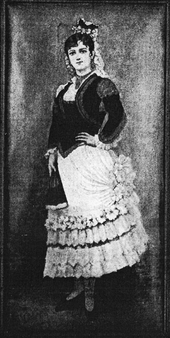
Célestine Galli-Marié as Carmen
People like to believe what they wish
This insight was written in Latin by the Roman general Gaius Iulius Caesar in his account of the Gallic War:
"Libenter homines id, quod volunt, credunt."
The Greek version of this sentence is as follows:
"Φύσει γὰρ ἄνθρωπος, ὃ βούλεται, τοῦτο καὶ οἴεται. »
The murderers are among us
The Murderers Are Among Us is the first German feature film in post-war history and the first German rubble film. The film is set in 1945 in bombed-out Berlin.
The story is about a former captain who had more than one hundred Polish civilians shot on Christmas Eve 1942. In the meantime, he has become a popular citizen and successful businessman who produces cooking pots from old steel helmets.
The director Wolfgang Staudte did not only deal with the German past, but also with his own, as he was involved in the production of the Nazi propaganda film Jud Süß.
The title is usually quoted when it comes to coming to terms with crimes committed during the National Socialist era:
- "The Murderers Are Among Us. The Ulm Einsatzgruppen Trial 1958" (exhibition)
- "The murderers are among us!" (nationwide day of action)
- "You can't look away: the murderers are among us."
The seagulls all look like they were named Emma
This is the much quoted beginning of a poem from the Galgenlieder by Christian Morgenstern, the first stanza of which reads thus:
The seagulls all look
like they are called Emma.
They wear white fluff and
can be shot with buckshot.
But Morgenstern has no intention of shooting down the seagulls:
I don't shoot a seagull dead,
I let it live and
feed it with rye bread and
reddish pineapple.
Zibeben (from the Arabic zibiba) are sultanas dried on the vine.
In the third and last stanza Morgenstern states:
"O man, you will never
reach flight beside the
seagull.
If your name is Emma, be content to be
like her."
In an article about seagulls as "ravens of the seas", Georg Rüschemeyer writes:
"How the poet arrived at this assessment has not been handed down. But his 'Seagull Song' reflects a positive image of the elegant birds, as it apparently still prevailed at the beginning of the 20th century."
The seagulls served the sailors as messengers of the nearby mainland. The zoologist Alfred Brehm praised their intelligence and flying skills.

Seagull
The upper ten thousand
In an editorial in the New York Evening Mirror newspaper of 11 November 1844, Nathaniel Parker Wittis wrote:
"At present there is no distinction among the upper ten thousand of the City."
"At present, there is no difference among the top ten thousand in the city."
He chose the number 10,000 because that was the number of socially acceptable New Yorkers in his day. In England they usually just say The upper ten.
Furthermore, the concept of the "upper ten thousand" can already be found in the Old Testament. There it is said of the Babylonian king Nebuchadnezzar after the capture of Jerusalem:
"And he carried away all Jerusalem, all the princes, and all the men of war, and ten thousand captives, and all the carpenters, and all the smiths, and left nothing but the least people of the land." (2 Kings 24:14 LUT)
The German phrase "upper ten thousand" is traced back to this passage in Luther's translation.
The film musical High Society, remake of The Night Before the Wedding, was released in German as Die oberen Zehntausend.
The party, the party is always right
This saying comes from a song of praise for the SED written by the German-speaking Czechoslovak Louis Fürnberg in 1950 under the title The Song of the Party. The refrain is as follows:
The Party, the Party, is always right!
And, comrades, let it remain so;
for he who fights for the right,
He is always right.
Against lies and exploitation. He who
insults life,
Is stupid or bad. He who
defends humanity,
Is always right.
Thus, from Lenin's spirit,
The party - the party - the party,
welded by Stalin, grows.
Fürnberg, a convinced communist, was not invited to the party congress of the Communist Party of Czechoslovakia for the first time in 1949, which deeply offended him. As his widow Lotte Fürnberg explained in 2001, he wrote the song to call himself back to order:
"He wrote it to justify the slight to himself."
The philosophers have only interpreted the world differently, but what matters is to change it
Karl Marx saw the task of philosophy in its abolition, that is, in its practical realisation.
In his eleventh Feuerbach thesis, Marx criticises all forms of idealistic philosophy and especially religion, which in his view only serves to make man's existence bearable through reveries and consolations in the afterlife, thus prolonging and legitimising misery.
Political power comes from the barrels of guns
Mao Zedong stated in his treatise "Problems of War and Strategy" in 1936:
「枪杆子里面出政权」
「Qiānggǎnzǐ lǐmiàn chū zhèngquán. 」
"[Every communist must understand this truth:] Political power comes from the barrels of guns."
During the Cultural Revolution, this statement was included in his "Selected Works", the so-called Mao Bible, and thus disseminated worldwide.
The police - your friend and helper
This slogan is intended to give the police a friendly image and presumably goes back to the Berlin politician Albert Grzesinski, who was Prussian Minister of the Interior from 1926 to 1930 and before that Berlin Police Commissioner. In the foreword to a book on the International Berlin Police Exhibition, which opened in September 1926, he states that the motto of the police is "to be friend, helper and comrade of the population". The slogan also served as the motto of the exhibition ("Die Polizei, dein Freund und Helfer - Bitte treten Sie näher!"), which attracted half a million visitors from Germany and abroad. In 1937, Heinrich Himmler then used it in a preface to the book "Die Polizei - einmal anders" (Franz-Eher-Verlag, Munich), by Helmuth Koschorke.
The presumed (co-)inventors are Carl Severing, who as Grzesinski's predecessor in the office of Prussian Minister of the Interior gave the opening speech, and the Berlin detective Erich Liebermann von Sonnenberg.
Grzesinski turned down the post of Reichswehr Minister in 1920 because he knew the Reichswehr's esprit de corps and its effects. From November 1922 to March 1924, he served as president of the Prussian State Police Office. When this office was dissolved, he acted as Police President of Berlin from May 1925 to October 1926.
The revolution eats its own children
In Georg Büchner's drama Danton's Death, Danton says in Act 1:
The revolution is like Saturn, it eats its own children.
The quote was based on the last words of the French lawyer and revolutionary Pierre Vergniaud shortly before his execution on 31 October 1793. He witnessed the execution of his political and personal friends, such as Brissot, Gensonné, Boyer-Fonfréde or Ducos, and was the last to be led to the scaffold. Shocked, he spoke these famous last words:
La Révolution est comme Saturne: elle dévore ses propres enfants.
The ancient god Saturn came to power by overpowering and castrating his father. A prophecy, however, foretold that he would be deprived of power by the hand of his own son. Therefore Saturn ate all his children except his sixth son Jupiter, whom Saturn's wife Ops kept hidden on the island of Crete. She offered Saturn a stone wrapped in clothes in his place.
See also French Revolution#Erosion and End of the Reign of Terror. Further examples are given in the article Political Purge (e.g. Röhmputsch, arrest and execution of Beria, 1938-1953 head of the secret services of the Soviet Union and as such a central figure of the Stalinist terror - also against top communist officials).
In a variation of this bon mot, the historian and ex-communist Wolfgang Leonhard (1921-2014) called his best-selling book Die Revolution entläßt ihre Kinder, published in 1955.
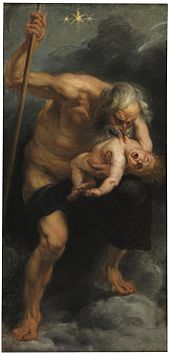
Rubens: Saturn devours his son
The harshest critics of the moose used to be themselves
This well-known two-liner is attributed to the writer and cartoonist Robert Gernhardt, but was written by the caricaturist F. W. Bernstein. Both received the Göttingen Elk, an award from the city of Göttingen for "a life's work of satirical provenance and/or a satirical multiple talent". This award, in turn, is named after the above quotation.
In an interview with the Hamburger Abendblatt, F. W. Bernstein when asked if he was offended by the fact that this legendary quote is often attributed to Robert Gernhardt:
"Oh well, he always denies it. A second after I thought of it while we were driving together, he remembered: 'The harshest critics of newts used to be newts themselves'. And mine has since become so much part of the vernacular that nobody really has a copyright on it any more."
The saying appeared as a Finnish proverb in a newspaper, was attributed to Bertolt Brecht and was even found on a gravestone. F. W. Bernstein saw it calmly and said:
"If I came along and shouted: 'That's from me, that's from me' - then they would say: 'Yes, of course, that's from you. And now be good and eat your soup'."
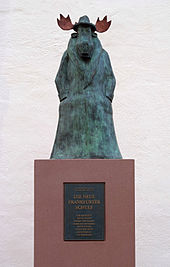
The moose in front of the Museum of Comic Art in Frankfurt
The school of the nation is the school
This sentence from Chancellor Willy Brandt's government declaration of 28 October 1969 changes an older sentence that had been directed at the German army since the Wilhelmine era. Brandt said, among other things:
"The nation's school is the school. We need the 10th school year, and we need the highest possible proportion of people in our society to receive a differentiated school education until the age of 18. The financial resources for education policy must be increased accordingly in the coming years."
Unwinding the soul
"Let the soul dangle" goes back to the first sentence of the 6th chapter of the summer story Schloß Gripsholm by Kurt Tucholsky. There it literally reads:
"We lay on the grass and dangled our souls."
The story deals with the first-person narrator's summer holiday with his girlfriend Lydia in Sweden. After some searching, they both end up at Gripsholm Castle, where they spend about three weeks.
The phrase derived from it, "to let the soul dangle", stands for to recuperate, to relax or to take a holiday from everyday life.
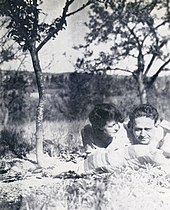
Tucholsky and Lisa Matthias in the Swedish Läggesta, 1929
Germany's security is also defended in the Hindu Kush.
With this core statement, the then German Defence Minister Peter Struck justified the new Defence Policy Guidelines (VPR) of the Bundeswehr in May 2003. He was referring to the Afghanistan mission in the Hindu Kush mountains there.
In an interview with the Frankfurter Allgemeine Zeitung on 16 March 2008, Struck reiterated his view:
"It is absolutely clear that the SPD, but also the CDU/CSU, the FDP and large parts of the Greens are standing against the majority will of the population with their clear support for the Afghanistan mission. Nevertheless, I stand by my position: Germany's interests will also be defended in the Hindu Kush."
The sun brings it to light.
This sentence is the title and the reciprocal verse of a poem by Adelbert von Chamisso:
Master Nikolas sat leisurely in the workshop, The
young housewife poured him a
drink,
It was in the cheerful sunshine. -The
sun brings it to day.
The poem tells of a murder that is solved at the end. At the end it says:
The sun brought it to light.
The Romans are crazy!
This expression comes from Obelix, one of the heroes in the French comic series Asterix. The Gauls, invincible thanks to their magic potion, are in constant conflict with the Romans, whose behaviour often seems incomprehensible to the simple-minded Obelix. His commentary is in French:
" Ils sont fous, ces Romains! »
With this statement, Obelix provokes a scandal at the Condate theatre in the booklet Asterix and the Copper Cauldron when he is asked to simply say what is on his mind:
"In total, Obelix and other characters use the quotation almost 30 times in the Asterix adventures published so far (of which Obelix: 22 times), with the target group being replaced according to the situation. With these variations, this idiom is used almost 80 times and has already found its way into colloquial usage."
In the booklet Quarrel for Asterix, Obelix says about the quarrelsome villagers:
"They're crazy, the human beings!"
Sophisticated Asterix fans believe that the Roman signum S.P.Q.R. (Senatus Populusque Romanus) is a rendering of a modern-day Italian winged word:
"Sono pazzi questi romani!"
"They're crazy, the Romans!"

SPQR
Language is given to man to conceal his thoughts
When the Spanish envoy Izquiero reminded Talleyrand in 1807 of the promises he had made in favour of the Spanish King Charles IV, Talleyrand replied, paraphrasing a saying by Voltaire:
"La parole a été donnée à l'homme pour déguiser sa pensée."
In Voltaire's fable The Capon and the Fattened Chicken, the capon says:
"Les hommes ne se servent de la pensée que pour autoriser leur injustices et n'emploient les paroles que pour déguiser leurs pensées."
"Men make use of thought only to justify their injustices, and they apply words only to conceal their thoughts."
A reversal of meaning is found in Molière's play The Forced Marriage (Le mariage forcé):
"La parole a été donnée à l'homme pour expliquer sa pensée."
"Language is given to man to explain his thoughts."
The voice of his master
His Master's Voice is the brand name of various record labels.
The name and the logo go back to the painter Francis Barraud, who in 1898 had portrayed his dog Nipper listening to an Edison phonograph. The newly founded Gramophone Company bought the picture, including copyright, from him for 100 pounds to use it in newspaper advertisements. The condition, however, was that the Edison phonograph originally depicted was painted over by a Berlin gramophone.
The logo became so popular that Gramophone Records changed the name of their record label to His Master's Voice in 1909.
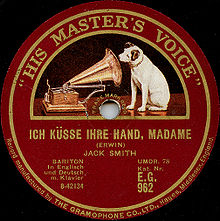
"His Master's Voice" record label, ca. 1928
The grapes hang too high
This expression is also common in the form "The grapes are too sour". It is applied to someone who pretends not to want something, but in reality is unable to obtain it. The expression is based on the Aesopian fable The Fox and the Grapes. It tells the story of a fox who wants to get some grapes and, when he notices that they are hanging too high, walks away saying that the grapes are sour after all.
The Unbearable Lightness of Being
The Unbearable Lightness of Being (Czech: Nesnesitelná lehkost bytí) is a novel by Czech author Milan Kundera, published in 1984 while he was in exile in France.
According to Kundera, the lightness of human existence is unbearable because a life flies away like dust. The central thoughts revolve around Friedrich Nietzsche's idea of the "eternal return".
The book title is occasionally quoted in a modified form:
- "The unbearable lightness of wine" (Der Spiegel, 2007)
- "The unbearable ease of access" (Neue Zürcher Zeitung, 2007)
The past should be a springboard, not a sofa
This exhortation comes from the British publisher and politician Harold Macmillan. The phrase is often used in speeches and as a motto for schools. For example, one speech says:
"... and can confidently quote Harold McMillan: 'The past should be a stepping stone, not a sofa'".
Lay down your arms!
In 1889, the Austrian writer Bertha von Suttner published the novel Die Waffen nieder! (Lay Down Your Arms), with which she fought against the idea that war could be a legitimate means of resolving conflicts between states. The novel was considered the most important work of anti-war literature until the publication of Erich Maria Remarque's novel Im Westen nichts Neues in 1929.
The title has also been translated into other languages:
- "Lay Down Your Arms!" (English)
- "Abbasso le Armi!" (Italian)
- "Bas les armes!" (french)
- "Abajo las armas!" (Spanish)
Seeking the truth in the facts
Deng Xiaoping's saying is meant to illustrate his departure from Maoist phrases. It reads in Chinese:
Chinese {{c}}
Shí shì qiú shì.
The cautious introduction of free-market elements into the planned economy was initially concentrated on agriculture, and in a short time brought about a significant improvement in supply.
Ironically, this slogan comes from Mao Zedong himself. It is found in Mao's essay On Practice. Thus, in 1980, Deng Xiaoping was quoted in the Beijing Review on the fourth anniversary of Mao's death as follows:
"... the core proposition of Mao Zedong's ideas is to seek truth in facts and to link the universal truth of Marxism-Leninism with the concrete practice of the Chinese revolution ..."
Unhinging the world
According to an Aristotle commentary by the philosopher Simplikios, this expression goes back to a saying by the ancient natural scientist Archimedes, who said in his Sicilian Greek:
"Δῶς μοι πᾶ στῶ καὶ τὰν γᾶν κινάσω. “
"Dōs moi pā stō, kai tān gān kināsō."
"Give me a fixed point and I will move the earth."
To unhinge the world today means as much as to fundamentally change everything. By the point, he means a fixed location outside the earth where he would lift the earth off its hinges by means of a pulley. Later, this sentence was seen as a reference to the laws of leverage.
.jpg)
Archimedes unhinges the world.
The world wants to be deceived
Sebastian Brant's Ship of Fools, published in 1494, states:
"the wellt the wants cheated syn"
It is often quoted in the Latin form:
"Mundus vult decipi."
Sebastian Frank's Paradoxa, published in 1533, states:
The world wants to be deceived and lied to and to be ruled only by delusion, as that monk says who considers his subject:
Mundus vult decipidarumb am
I here,to
whom all the sacks were filled for wages.
This is the basis of:
"Mundus vult decipi, ergo decipiatur.
" "The world wants to be deceived, therefore let it be deceived."
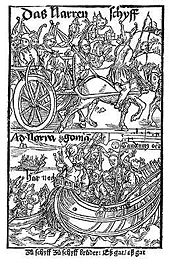
Title page from Sebastian Brant's Ship of Fools
World history is not the ground of happiness
The philosopher Georg Wilhelm FriedrichHegel said in his lectures on the philosophy of history:
"World history is not the soil of happiness. The period of happiness are empty leaves in it."
In world history and the rise and fall of individual states, the objective spirit becomes the general "world spirit".
The historian Leopold von Ranke wrote on the same topic:
"The happiest times of mankind are the blank pages in the book of history."
The French state theorist Charles-Louis de Montesquieu wrote:
"Happy the people whose history is boring."
The Wonderful Years
Die wunderbaren Jahre is a collection of prose texts by Reiner Kunze that was published in the Federal Republic of Germany in 1976. The author, who was still living in the GDR at the time, wrote the texts around 1975 and had the manuscript secretly transmitted to the Federal Republic. The publication of the text in the West led to Kunze being expelled from the GDR Writers' Association and 15,000 copies of Kunze's children's book Der Löwe Leopold, which had already been printed in the GDR, being cancelled.
The book and the film are about the miracles that are possible between young people and about years that are devoid of these miracles because people are deprived of their youth. The title refers to a passage in Truman Capote's novel The Grass Harp:
I was eleven, and later I became sixteen
. I didn't earn
any
merits,
but those were the wonderful
years.
A nostalgic song by Sportfreunde Stiller is called In all the wonderful years.
The dignity of the human being is inviolable
Article 1 of the German Basic Law contains this formulation of human dignity:
"Human dignity is inviolable. It is the duty of all state authority to respect and protect it.
It goes on to say:
"The German people therefore profess inviolable and inalienable human rights as the basis of every human community, peace and justice in the world."
This fundamental right is to be understood as a conscious reaction to the massive disregard for human dignity by the National Socialist state.

The first articles of the Basic Law in the Jakob Kaiser House
This was the first prank
In the picture story Max and Moritz by Wilhelm Busch, the second prank of the two rascals is announced in the text with these words, while Widow Bolte goes into the house with her dead chickens.
This was the first prank,
but the second one follows immediately.
The quote is used today to comment on a successful action that is seen as the beginning of further actions:
- "This was the first prank ... - Evil neighbours make the DS unsafe."
- "Alexa was just the first prank."
_016.png)
"This was the first prank."
Thing in itself
The philosophical expression thing-in-itself is found in Immanuel Kant's Critique of Pure Reason, where it states:
"... consequently we cannot have knowledge of any object as a thing in itself, but only insofar as it is the object of sensual perception...".
Elsewhere Kant wrote:
"What it might be about the objects themselves and apart from all this receptivity of our sensuality, remains completely unknown to us".
Outside of philosophical terminology, one speaks of a thing in itself when the essence of a thing is to be designated.
Do ut des
→ Main article: Do ut des
This ancient Roman legal formula, which was used when concluding contracts or barter transactions, translates as:
"I give so that you may give."
This implies that a counter-gift or counter-service is expected. This formula is found in the main work of the Dutch legal scholar Hugo Grotius, which he published in 1625 under the title De jure belli ac pacis libri tres ("Three Books on the Law of War and Peace").
But the blessing comes from above
This quote comes from Friedrich Schiller's poem Das Lied von der Glocke:
The
sweat must run hot from the forehead,
If the work is to praise the master;
But the blessing comes from above.
The first stanza ends with these words.
Today, this quote is almost only used ironically, for example when a downpour comes from above.
But the conditions, they are not so
This quote comes from Bertolt Brecht's Threepenny Opera. There, the businessman Peachum, well-meaning towards the poor, states with the Bible in his hands:
But unfortunately, we have never heard that
anyone has received justice - oh where!
Who wouldn't have liked to be right for onceBut the
circumstances are not like that.
Don't worry, be happy!
"Don't worry, be happy!" (in German: "Don't worry, be happy!") were the last words of the Indian guru Meher Baba before his vow of silence. He criticised people for shouting at each other and therefore remained silent for the remaining 44 years of his life from 10 July 1925. From then on, he used alphabetic tablets and hand signs to communicate.
In the 1988 hit song Don't Worry, Be Happy by Bobby McFerrin, McFerrin elaborated on Baba's last words. His song begins as follows:
Here's a little song I wroteYou
might want to sing it note for noteDon
't worry, be happy.
In every life we have some troubleBut
when you worry you make it doubleDon'
t worry, be happy.
Don't worry, be happy now.
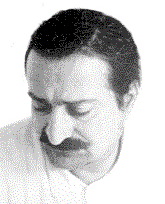
Meher Baba
Where you burn books, you end up burning people too
This quote comes from Heinrich Heine's 1821 tragedy Almansor. The play is set around 1500, a few years after the conquest of Granada, the last Islamic empire of Moorish Spain. In it, the title character, Almansor ben Abdullah, talks to Hassan, a Muslim who is desperately fighting the Christian conquerors, about the burning of the Koran ordered by the Spanish Inquisitor, Cardinal Francisco Jiménez de Cisneros.
Almansor:
We heard that the terrible Ximenes, in the
midst of the marketplace of Granada
-my tongue sticks in my mouth-
threw
the Koran into the
flames of a funeral pyre!
Hassan:
That was just a prelude, where you burn books,
you end up
burning
people.
The sentence is understood as a criticism of the rather symbolic book burning that took place in 1817 on the fringes of the Wartburg Festival in Eisenach. Heine wrote about the festival that "stupid things were said and done there that were worthy of the most stupid Middle Ages". However, the quotation is not least considered prophetic with regard to the book burnings of the National Socialists.
Dr Livingstone, I presume?
With this English phrase of courtesy (Dr Livingstone, I presume?), the young journalist Henry Morton Stanley addressed the Scottish missionary David Livingstone in the Tanzanian village of Ujiji, who had been thought to be missing since 1869 and whom he had been sent out to find. Livingston responded as formally as was proper among British gentlemen:
"Yes', he said, with a kind smile, lifting his cap slightly."
("'Yes', he said, with a friendly smile, and luffed his hat.")
Since there were no other white men around and the two Britons had not yet been formally introduced to each other, this was the correct way to greet each other without breaking etiquette. The fact that both men observed this etiquette even in what was then considered a remote and "uncivilised" environment was seen by contemporaries as proof of European civilisation and the taken-for-granted superiority of the "white race". This contributed decisively to the fact that a greeting phrase that was banal in other contexts became a commonplace, especially in the Anglo-Saxon world.
Livingstone expressed surprise to Stanley that he was considered missing. The two fundamentally different personalities then spent the next five months exploring together.
The Stuttgarter Zeitung wrote about Livingstone under the headline Dr. Livingstone, I presume?
"He is regarded as one of the greatest heroes of the Victorian age and even gave the British a common saying: when he was thought to be missing, a New York newspaper had commissioned a journalist to search for him. When Henry Morton Stanley, on his long journey, came face to face with a European for the first time in weeks, he said, 'Dr Livingstone, I presume?'"
.png)
Illustration of the meeting of Stanley and Livingstone
Draconian punishment
The laws of Dracon have become proverbial because of their severity and harshness. Aristotle also points to this in his Politics (II, 1274b), where he states that there was nothing remarkable about them except their severity. In his Rhetoric (1400b) he quotes Herodicus, who calls them "laws of a dragon", not those of a man.
Outside the door
Draußen vor der Tür is a play by Wolfgang Borchert with the subtitle "A play that no theatre wants to play and no audience wants to see", which was first broadcast as a radio play in 1947.
A man named Beckmann returns home from war captivity in Siberia with only one kneecap, limping and freezing, and finds everything different from how he left it. He is "one of those who come home and then don't come home because there is no home for them any more. And their home is then outside the door."
Three Graces
The three Graces are daughters of Zeus and Eurynome and are called Euphrosyne ("cheerfulness"), Thalia ("blossoming happiness") and Aglaia ("radiance"). The three Graces were a popular subject of visual art.
Three times moved is as good as once burnt down
This saying is already found in Benjamin Franklin's preface to his Poor Richard's Almanac:
I never saw, an oft removed Tree,
Nor yet an oft removed Family,
That throve so well, as those that settled be.
And again,
Three removals are as bad as a Fire.
"I never saw a tree that had been moved many times, nor a family that had moved many times, that thrived as well as those that had their permanent place. And again, three moves are as bad as one fire."
The saying is still used today to express that something always gets broken or lost when moving. The generation that lived through the Second World War also knows the saying in a modified form: "Three times moved is like once bombed out.
Third World
The term Third World (Tiers Monde) is of French origin and became common in the 1950s to describe countries that belonged neither to the first world of industrialised countries nor to the second world of state-trading countries. Since the term soon met with rejection, it was gradually pushed back by the term One World, which was coined for various reasons.
The term Third World (from French tiers-monde) was coined by the French demographer Alfred Sauvy, who developed the term analogously to the Third Estate (French tiers-état) in his article Trois mondes, une planète in L'Observateur in 1952. When Frantz Fanon equated the Third World with the colonised, underdeveloped world in his 1961 paper "The Damned of the Earth" and introduced the term into international usage, it was already in common use, at least in the French-speaking world. Originally, Third World referred to the non-aligned states that called themselves the third bloc to distinguish themselves from the East-West conflict; today, however, the term is often used as a synonym for developing country.
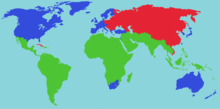
The three worlds1 . World: blue2 . World: red3 . World: green
Therefore test who binds himself eternally...
Schiller's Song of the Bell was very popular with the bourgeois idealism of the 19th century, as can be seen from the abundance of phrases adopted from it into linguistic usage. Today, however, many are often used only jokingly:
Therefore test who binds himself eternally,
Whether the heart finds its way to the heart!
Delusion is short, regret is long.
Pranksters have turned it into "Drum prüfe wer sich ewig bindet, ob sich nicht doch was besseres findet" or "Drum prüfe wer sich ewig bindet, wo sich das Standesamt befindet" or "Drum prüfe wer sich ewig bindet, ob sich auch Geld zur Scheidung finden"!
When couples who have been friends for a long time decide to get married, the short form of the saying is also changed to:
"Therefore bind him who is eternally tested."
You are Germany
Du bist Deutschland is a social marketing campaign aimed at positive thinking and a new German national feeling. It was launched by 25 media companies as part of the Partners for Innovation initiative and coordinated by Bertelsmann. The large-scale campaign was controversial. The initiator of the campaign was Gunter Thielen, Chairman and CEO of Bertelsmann AG.
The slogan was criticised and parodied by various media. For example, there is the variant "Du bist Terrorist" (You are a terrorist) by Alexander Lehmann, which is also used in a slightly modified form as an election commercial by the Pirate Party of Germany. A historical photograph from the 1930s shows a large banner under the face of Adolf Hitler with the almost literal quote: "Because you are Germany".

You are Germany.
You are what you eat
This statement, which paraphrases Ludwig Feuerbach's famous dictum Man is what he eats, is intended to express that one can judge a person by his diet. Furthermore, the phrase is often used in the context of nutrition science, dietetics and similar fields.
Psychologist Paul Rozin considers the phrase to be a form of magical thinking and thus the "essential cause of food refusals", which he tried to prove with a corresponding study in 1987.
You are like a flower
In the cycle of 88 poems by Heinrich Heine entitled Die Heimkehr, No. 47 begins with the following words:
You are like a flowerSo
lovely and beautiful and pure.
This love poem was set to music by Franz Liszt, Robert Schumann and Hugo Wolf.
You always remain what you are
Mephisto teaches Faust in the study scene in Goethe's Faust I that all his striving is of no use to him:
You are at the end - what you are.
Put on wigs of millions of curls,
Put your foot on socks as high as an ell,
You always remain what you are.
You see the waistcoat, not the heart
This is a quotation from Schein und Sein. The poems left behind by Wilhelm Busch:
My child, all things here,
Whether great or small,Are essentially packed in such a way,
That they cannot be cracked like nuts.
How would you dare to
fathom people in a nutshell.
You only know them from the outside.
You see the waistcoat, not the heart.
This quote can also be found as a motto for an article about the difficulties managers experience during recruitment interviews and personnel selection.
Looking stupid
The expression means: to go out empty-handed, to lose out, to look stupid because of it. This expression is said to have arisen during the First World War. The word has a similar meaning: to look at the moon or to look down the tube.
Stupid fucks good
The saying alludes to the supposed libidinousness of poorly educated classes and attests to less intelligent people, especially women, better copulation or greater satisfaction of the (male) partner, combined with easier availability. The saying has been proven not to be true in various studies; in fact, the opposite is the case.
Dark Earth
In 1878, the British-American journalist Henry Morton Stanley published his account of a trip to Africa under the title Through the Dark Continent. Stanley honestly admitted to loathing the continent. Dark, in Stanley's eyes, was not only the skin colour of Africa's inhabitants.
In labelling Africa as a dark continent, the idea of the unknown was probably mixed with that of the area inhabited by dark-skinned people.
Love: Dark Continent is also the title of a book of poems by Ingeborg Bachmann. Arno Widmann wrote "Der dunkle Erdteil" ("The Dark Continent") in an article in the Berliner Zeitung about the Queen of England's first visit to London's East End proletarian district.
In the dark continent of Africa is the title of a nonsense poem by Joachim Ringelnatz, which reads as follows:
In the dark continent of Africa,
an accordion died.
She was buried with music.
Twenty ravens sat at the grave.
The raven Num'ro twenty-oneFlied by sailing ship to DanzigAnd
founded there a little laterA
home for childless fathers.
And the moral of the story?
Unfortunately, I don't know it myself.
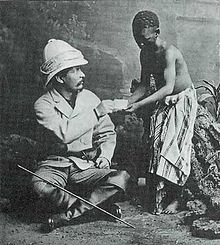
Henry Morton Stanley
Shine by absence
"To shine by absence" (French: Briller par son absence) originally goes back to Tacitus, who in his Annals (Annales III, 76) tells how Iunia Tertia, the wife of Cassius and sister of Brutus, was buried. According to Roman custom, the pictures of relatives were carried in front of a funeral procession,
"but Cassius and Brutus shone forth precisely because their likenesses were not seen" (Latin sed praefulgebant Cassius atque Brutus eo ipso quod effigies eorum non visebantur. ).
According to Roman law, it was forbidden to show the images of murderers in public. This applied to Cassius and Brutus at this funeral, who were among the murderers of Gaius Julius Caesar.
Based on this source, Marie-Joseph Chénier (1764-1811) formulated in his tragedy "Tibére" (1811):
"Brutus et Cassius brillaient par leur absence." ("Brutus and Cassius shone by their absence.")
and thus created a colloquial expression.
A jolt must go through Germany
German President Roman Herzog said in his Berlin speech on 26 April 1997 at the Adlon Hotel in Berlin:
"But it is not too late either. A jolt must go through Germany. We have to say goodbye to cherished possessions. Everyone is addressed, everyone must make sacrifices, everyone must participate:
- employers by cutting costs not only through layoffs.
- workers by bringing working hours and wages in line with the situation of their companies.
- the trade unions by enabling company-based collective agreements and more flexible industrial relations.
- Bundestag and Bundesrat by moving the major reform projects forward quickly now.
- interest groups in our country by not working to the detriment of the common good."
This "jerk" is still often quoted today, often in a satirical sense. The future Federal President Horst Köhler also referred to Herzog's "jerk" speech in his inaugural speech on 23 May 2004:
"Why are we still not getting the jolt? Because we're all still waiting for it to happen!"
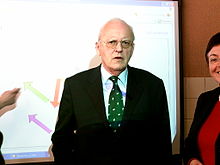
Roman Herzog
Through the woods, through the meadows
This is the beginning of the aria of the hunter boy Max from Carl Maria von Weber's opera Der Freischütz, the text of which is by Johann Friedrich Kind:
Through the woods, through the meadows
I went lightly.
All that I could see was the
profit of the secure reed.
He must come through this hollow alley
The quotation comes from Wilhelm Tell's monologue in Friedrich Schiller's drama of the same name, where Tell awaits the imperial bailiff Gessler to kill him:
"There is no other way to Küssnacht. - I'll finish it here. - The opportunity is favourable."
In the Süddeutsche Zeitung, under the headline "You can build on these phrases", it says about this famous Schiller quote:
"No actor who has to execute the assassin's monologue in the third scene of the fourth act of "William Tell" can get past these tormentors.
Unlike the "beautiful passages" of an operatic aria, they are above all one thing: stumbling blocks. "Through this hollow alley he must come", the verse wants to be taken like a hurdle, and the only consolation is that the actor who gives the Gessler will not fare differently a little later when he groans "That's Tell's bullet", fearing death much less than the laughs in the audience."
The Hohle Gasse is an artificially built hollow way between Küssnacht am Rigi and Immensee. Wilhelm Tell is said to have shot the Habsburg bailiff Hermann Gessler in the Hohlen Gasse in 1307.

Hollow alley in Küssnacht
Through my fault
"Mea culpa, mea culpa, mea maxima culpa!"
"My fault, my fault, my exceeding fault!"
These Latin words were in the Confession of Guilt of the Catholic Mass, where it says:
"Confiteor Dei omnipotenti, beatae Mariae Virgini [...] et vobis, fratres, quia peccavi nimis cogitatione, verbo et opere: mea culpa, mea culpa, mea maxima culpa!"
"I confess to God Almighty, to the Blessed Virgin Mary [...] and to you, brethren, that I have sinned much in thought, word, and deed: through my fault, through my guilt, through my exceeding great fault."
The formula is found for the first time in the Ordines Romani, whose author was probably Cardinal Jakob Cajetan, and has also passed into the liturgies of the Protestant Church. Before Vatican II, only the Latin version was prayed, and its use was mandatory. The prayer is part of the Prayer of the Steps, which the priest prays in turn with the altar server or the congregation before approaching the altar at the beginning of Mass.
Through the mouth of two witnesses the truth is known everywhere
This sentence is found in Goethe's drama Faust I. Mephistopheles wants to witness the death of Marthe Schwerdtlein's husband together with Faust:
Your husband is dead and sends his regards.
Marthe.
Oh, tell me quickly!
I would like to have a certificate,
Where, how and when my darling died and was buried.
I have always been a friend of order,
I would like to read him dead in the weekly paper.
Mephistopheles.
Yes, good woman, through the mouth of two witnesses the
truth will be
known everywhere;
I still have a fine companion,
whom I will present to
you before the judge.
Mephistopheles thus takes up a passage from the Gospel of John:
"It is also written in your law that the testimony of two men is true."
The evangelist John thus points to the 5th Book of Moses, where it says:
"There shall no single witness appear against any man concerning any iniquity or sin, ... but in the mouth of two or three witnesses shall the matter stand."
Questions and Answers
Q: What does the idiom "The road to hell is paved with good intentions" mean?
A: The idiom implies that even though someone may have good intentions, their actions could lead to failure.
Q: What is the difference between intentions and actions?
A: Intentions refer to a person's plans, while actions are what a person actually does.
Q: Can good intentions lead to failure?
A: Yes, good intentions may not always translate into successful actions and can even make the situation worse.
Q: Is the phrase a proverb or an idiom?
A: The phrase is commonly used as both a proverb and an idiom.
Q: What message is conveyed through this idiom?
A: The idiom conveys that intentions alone are not enough to achieve success, and that actions must accompany them.
Q: Does the phrase have a negative connotation?
A: Yes, the phrase has a negative connotation because it implies that good intentions are not always enough to succeed.
Q: How can someone avoid the road to failure?
A: To avoid the road to failure, one should ensure that their actions align with their intentions and have a clear plan in place.
Search within the encyclopedia